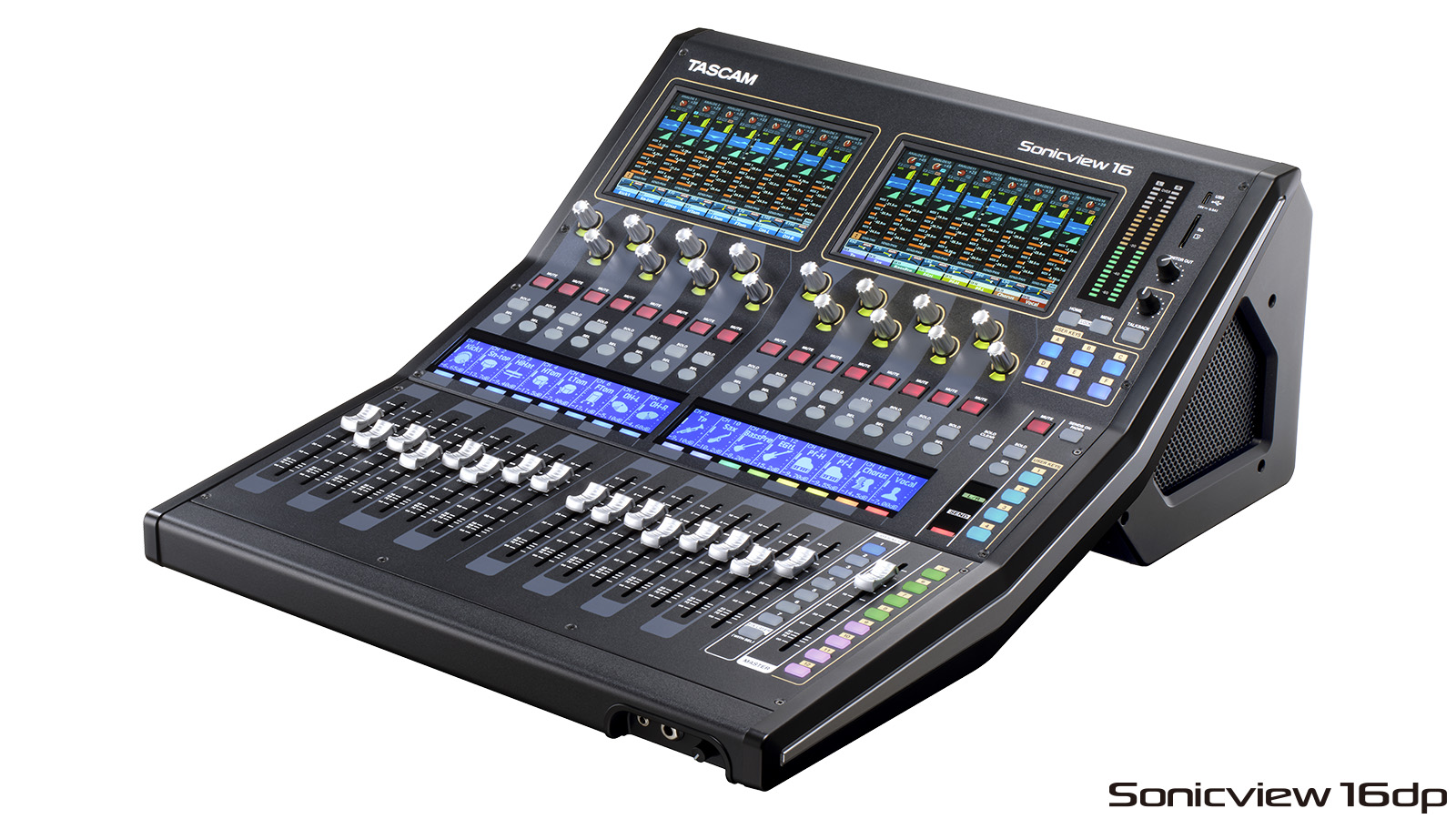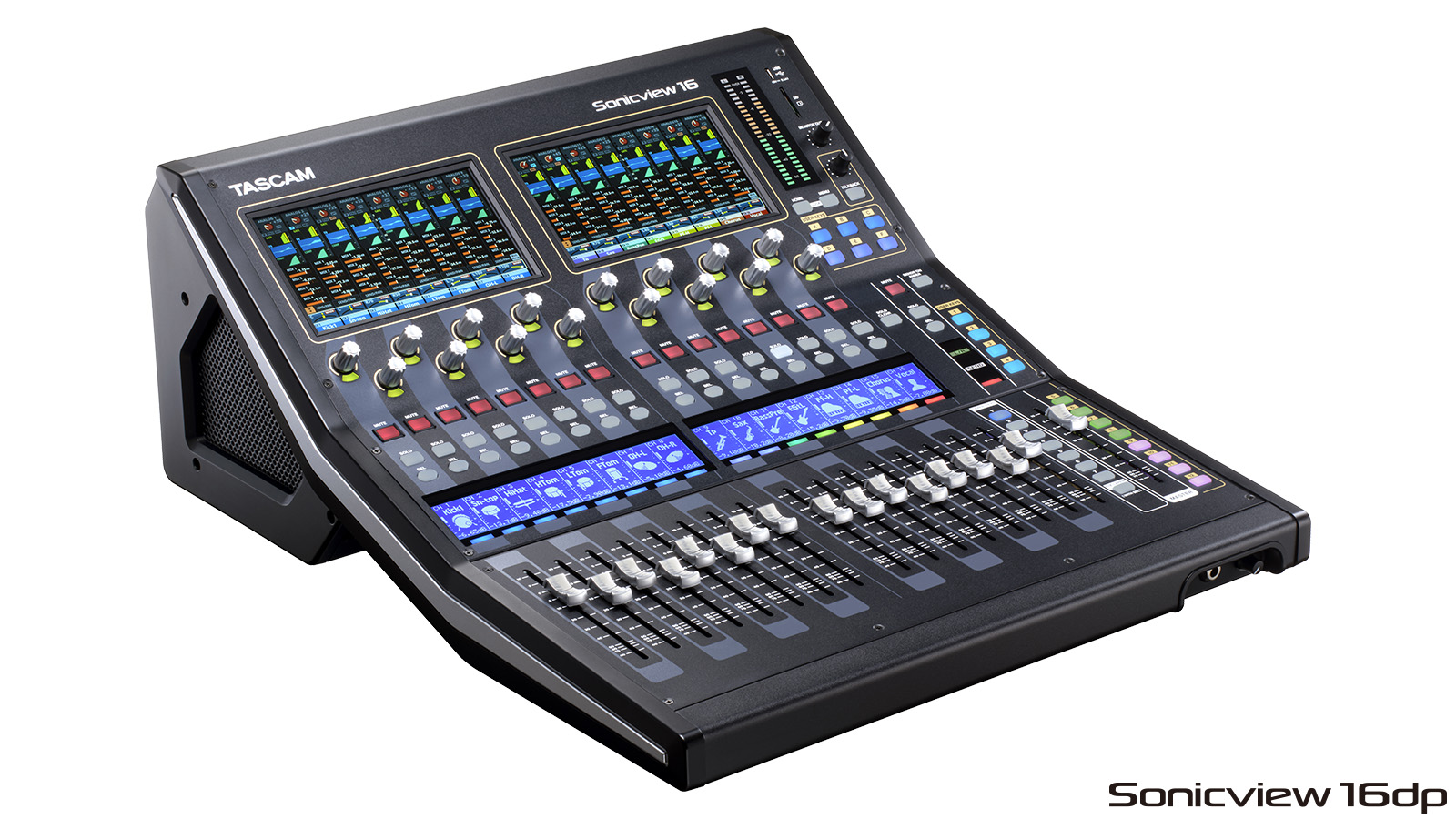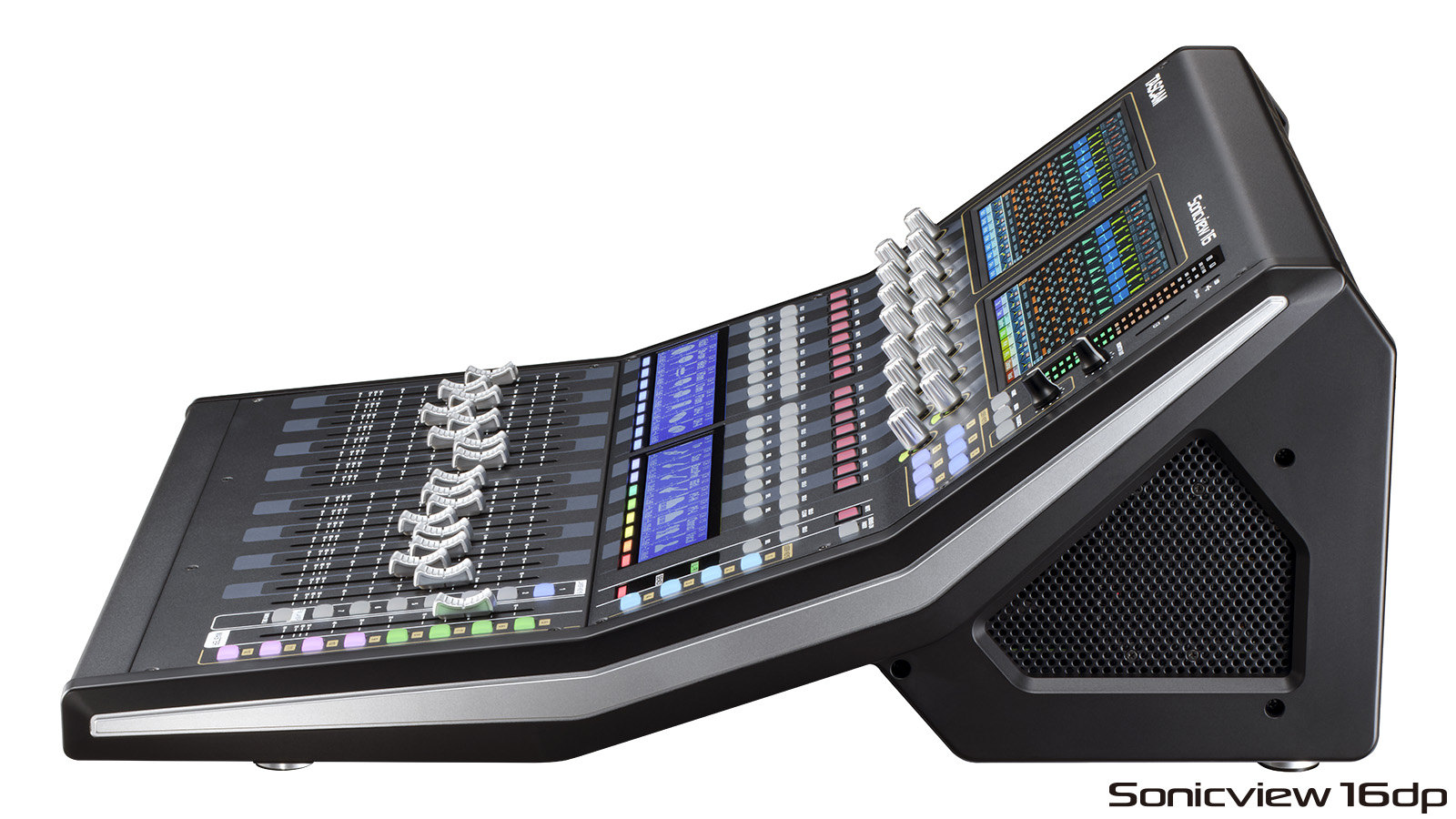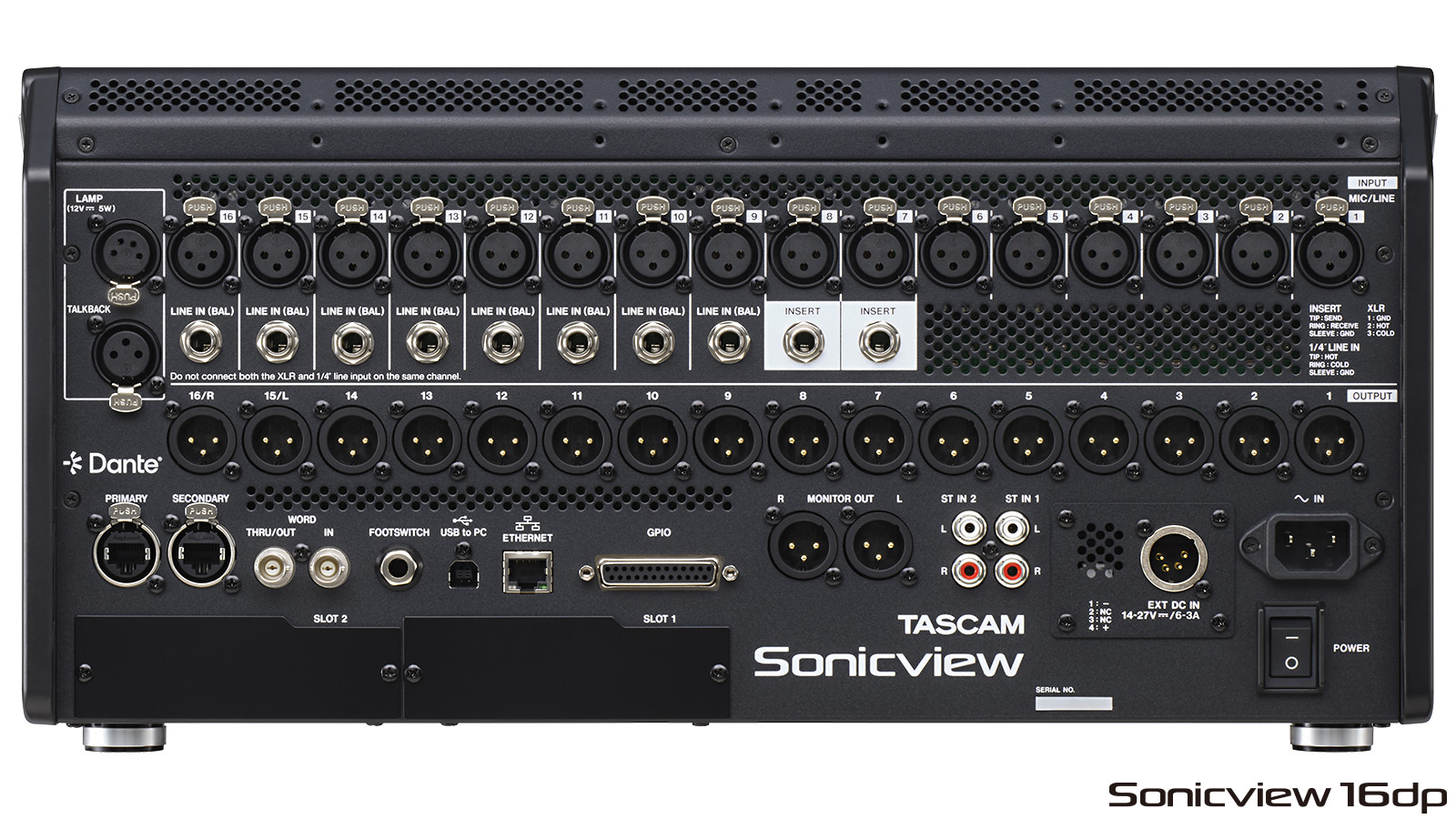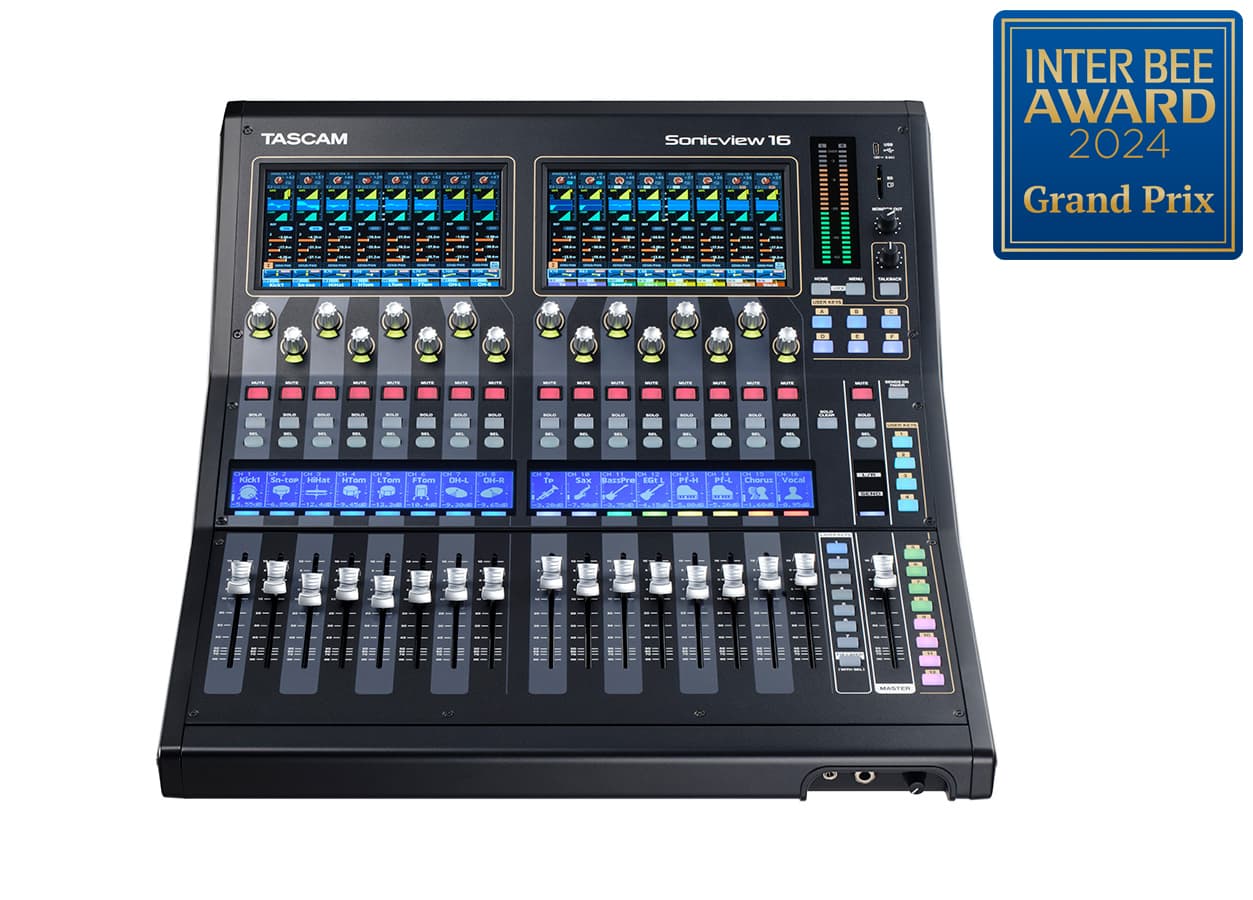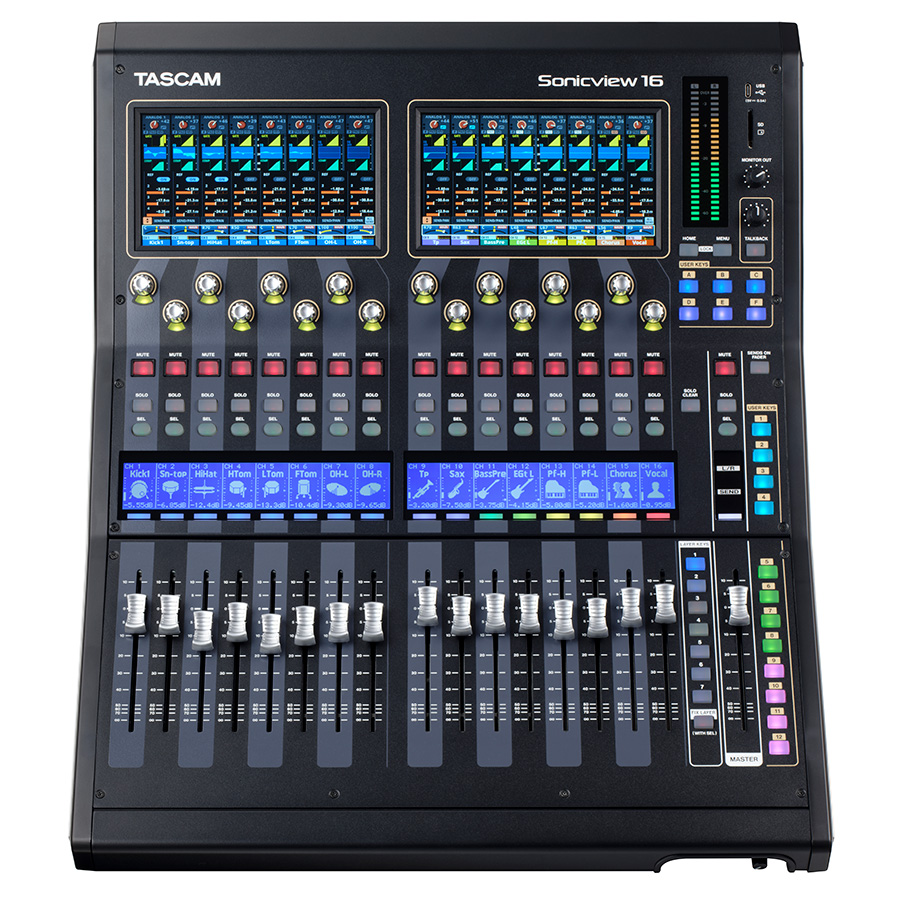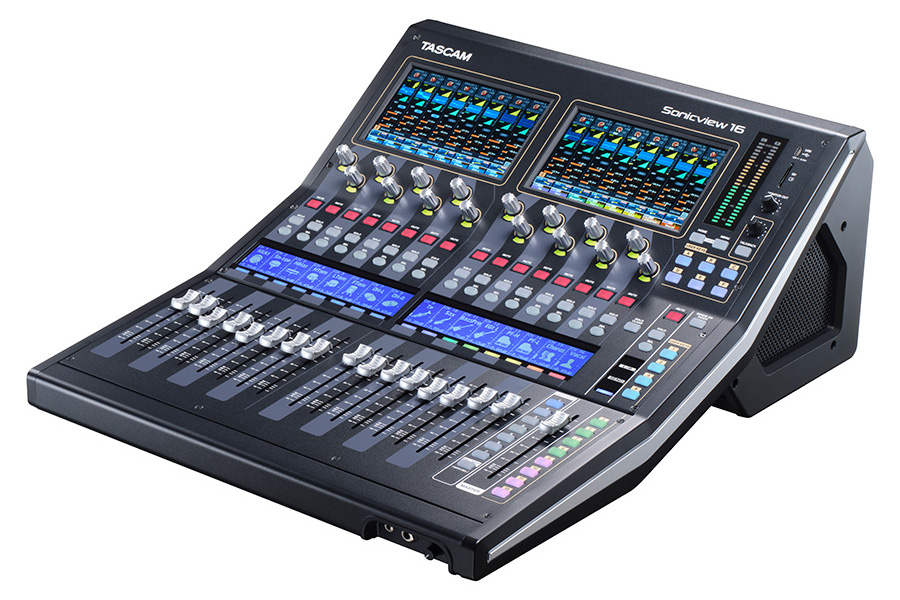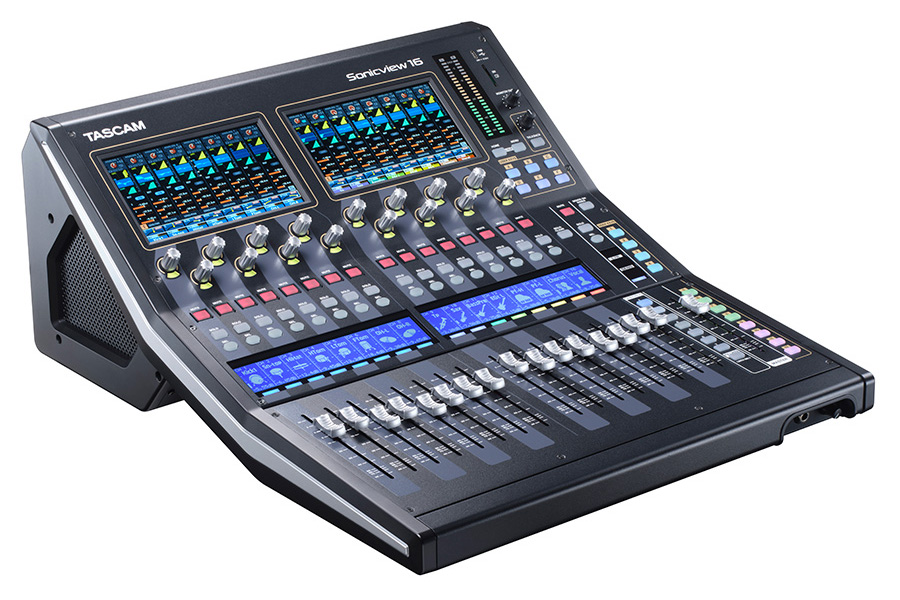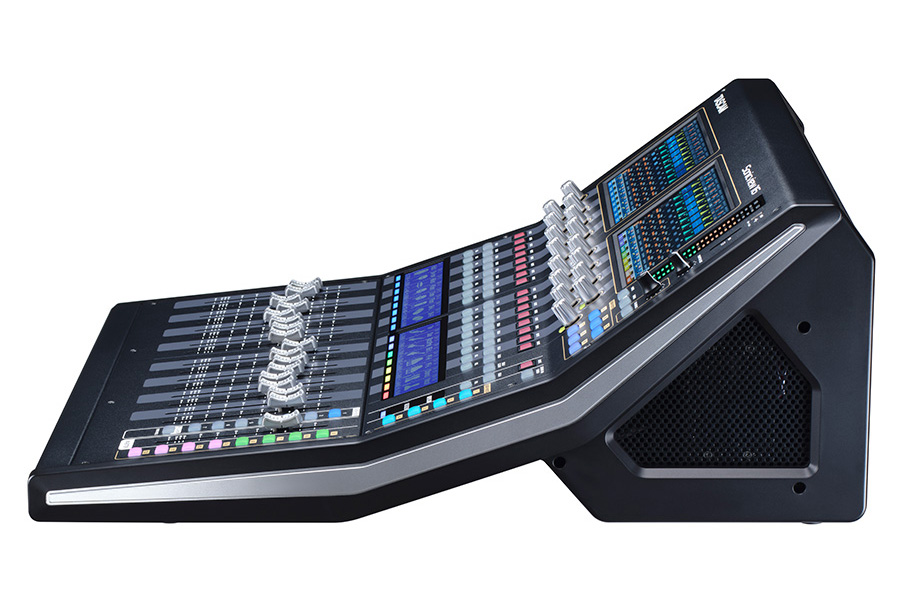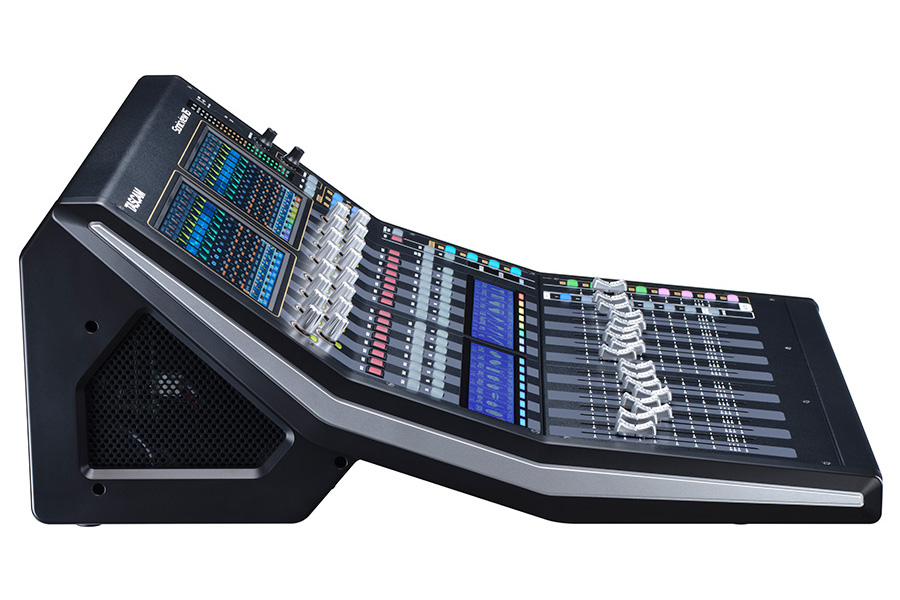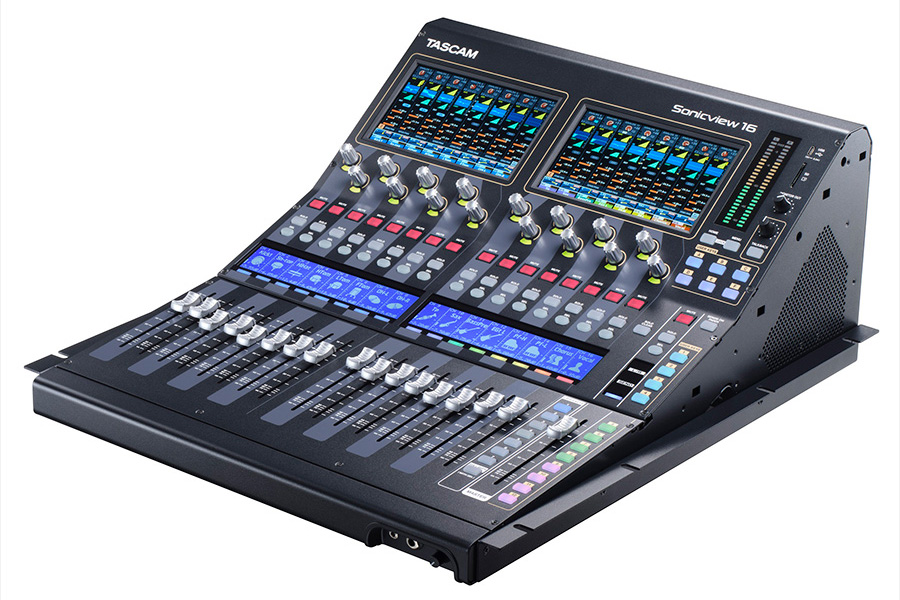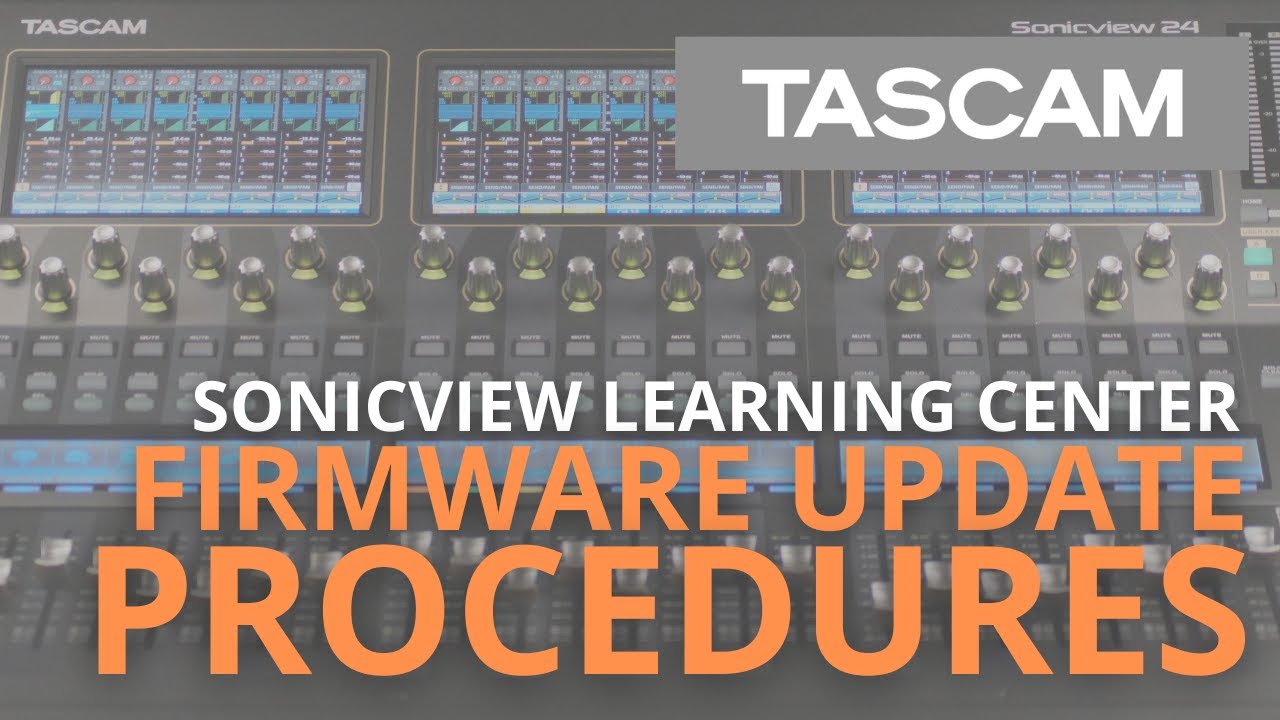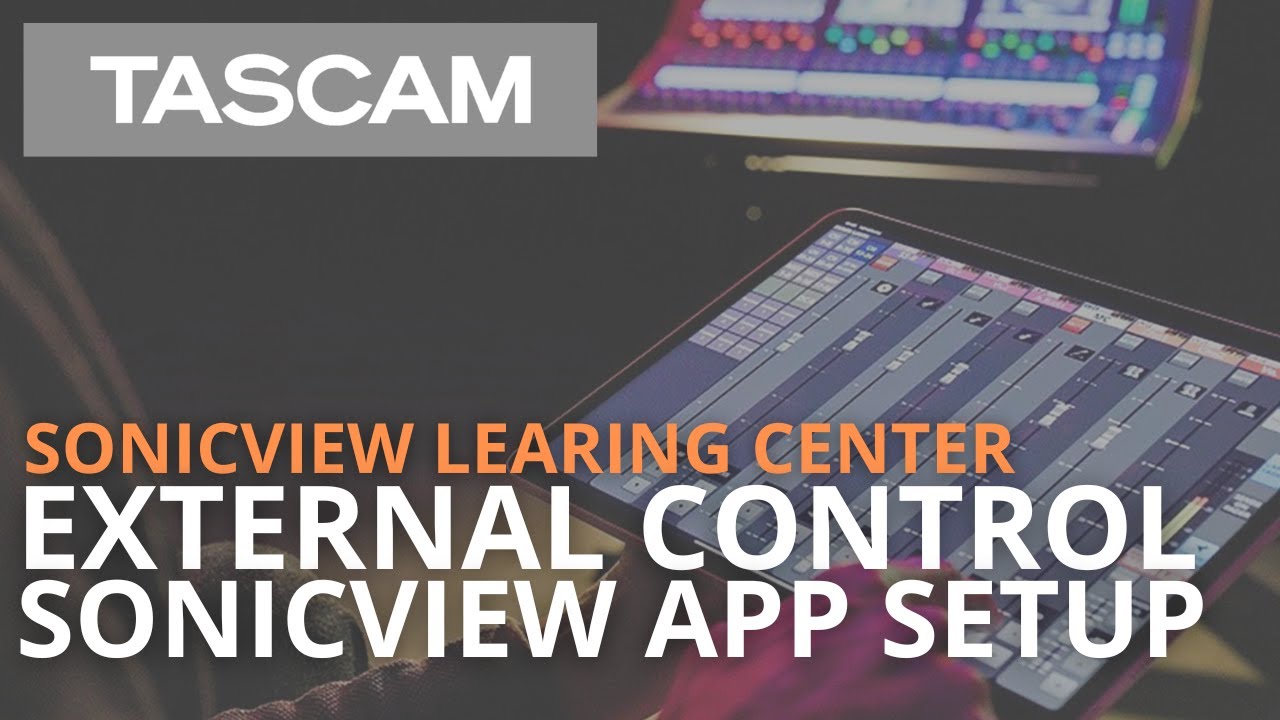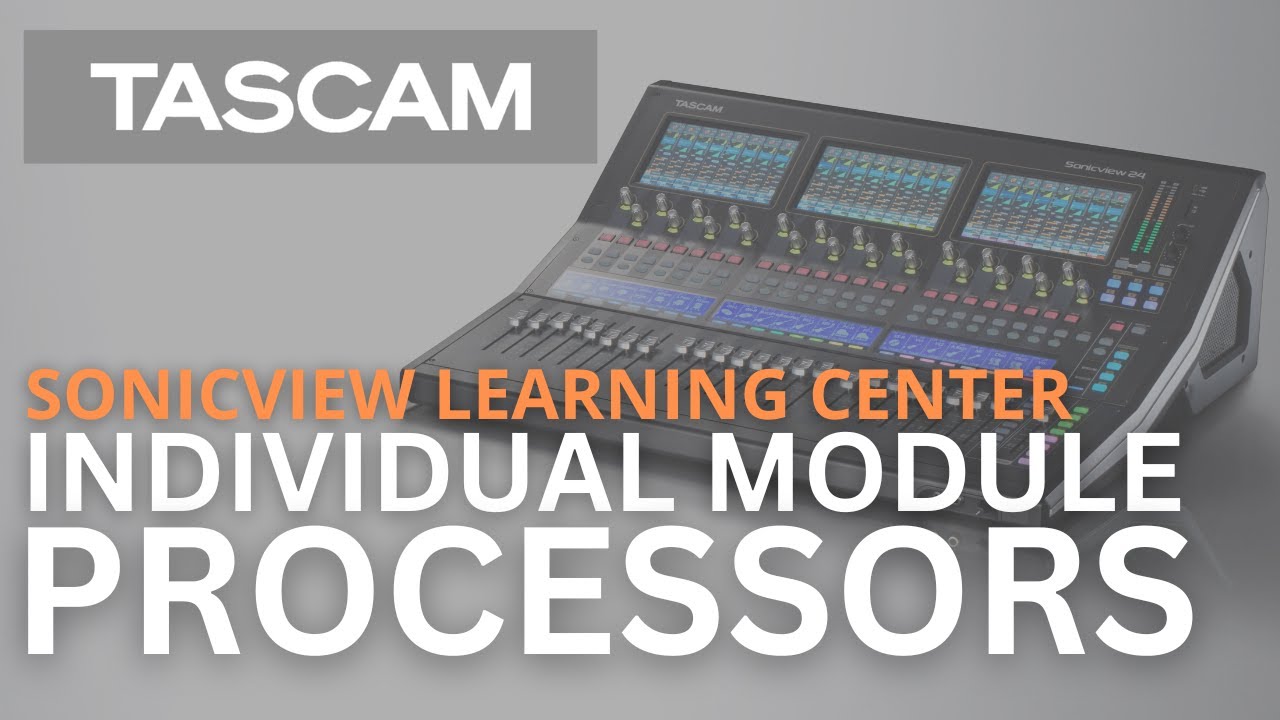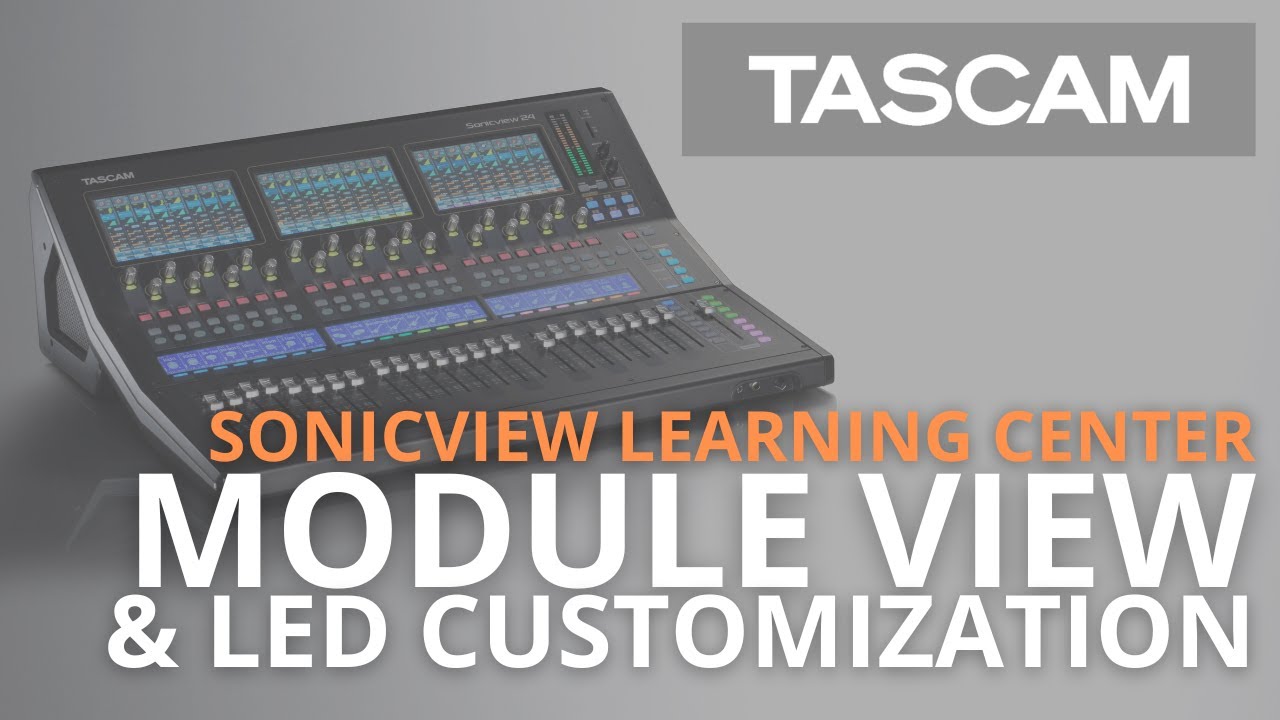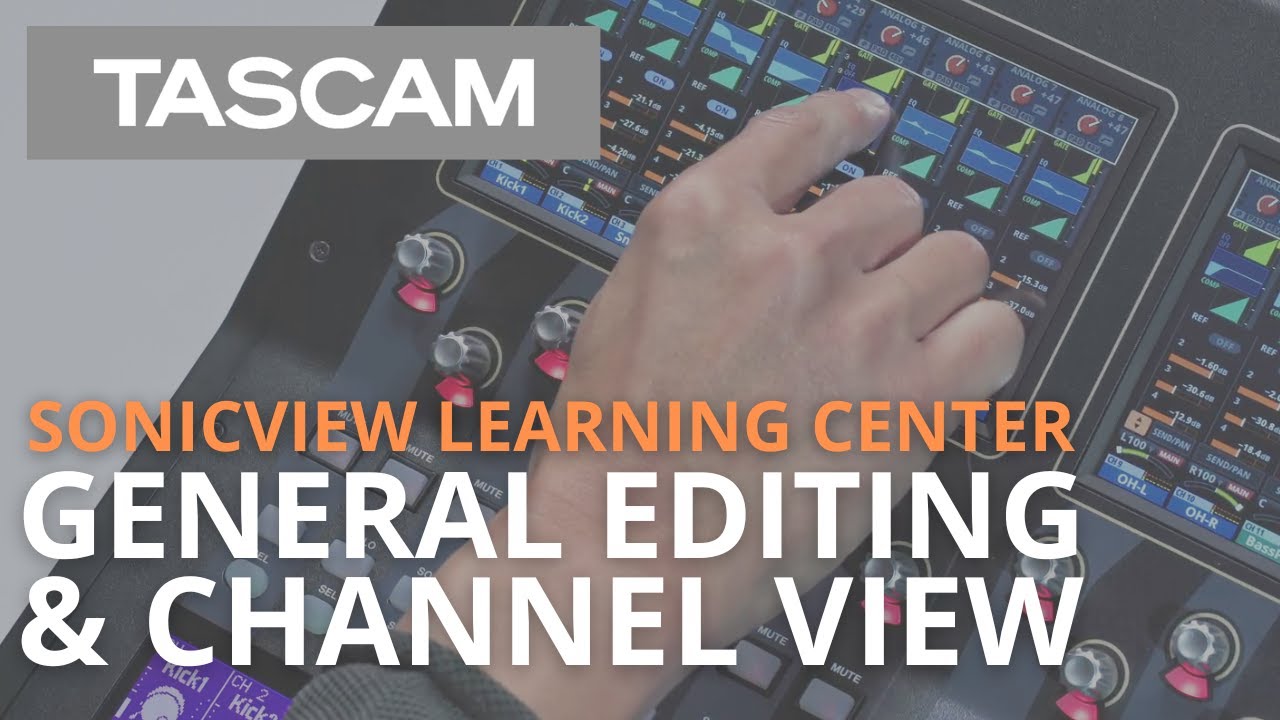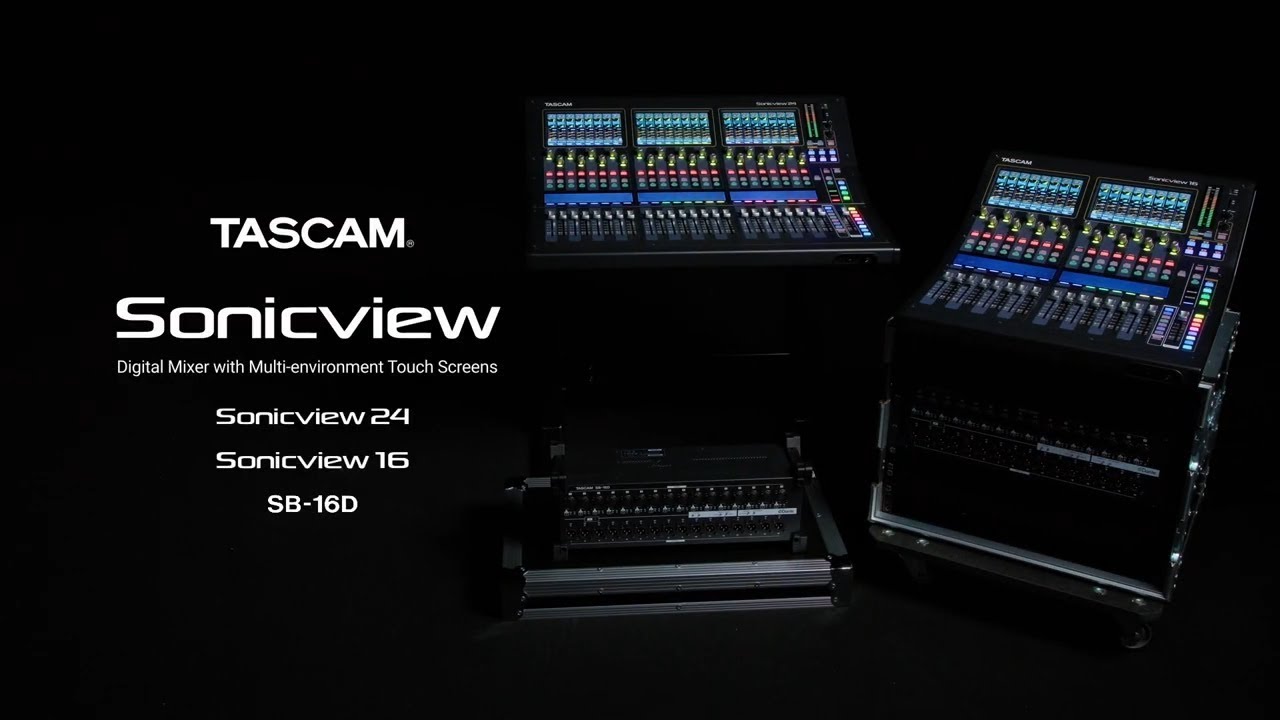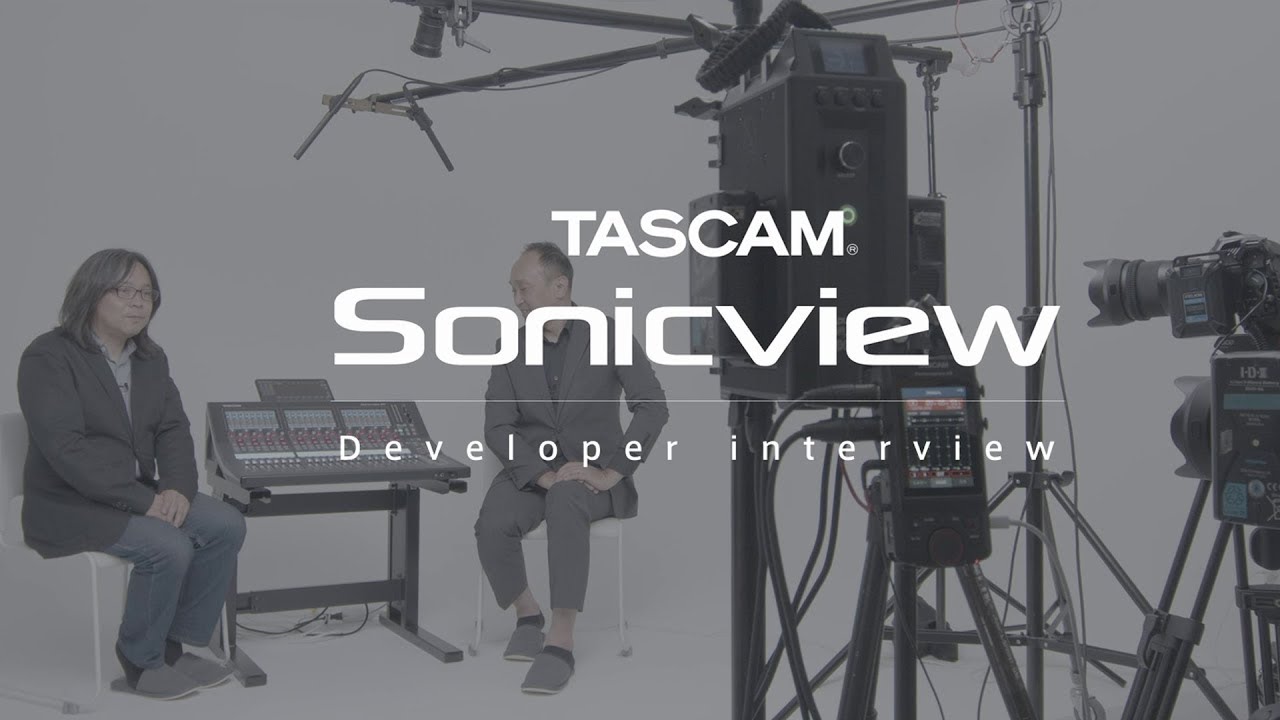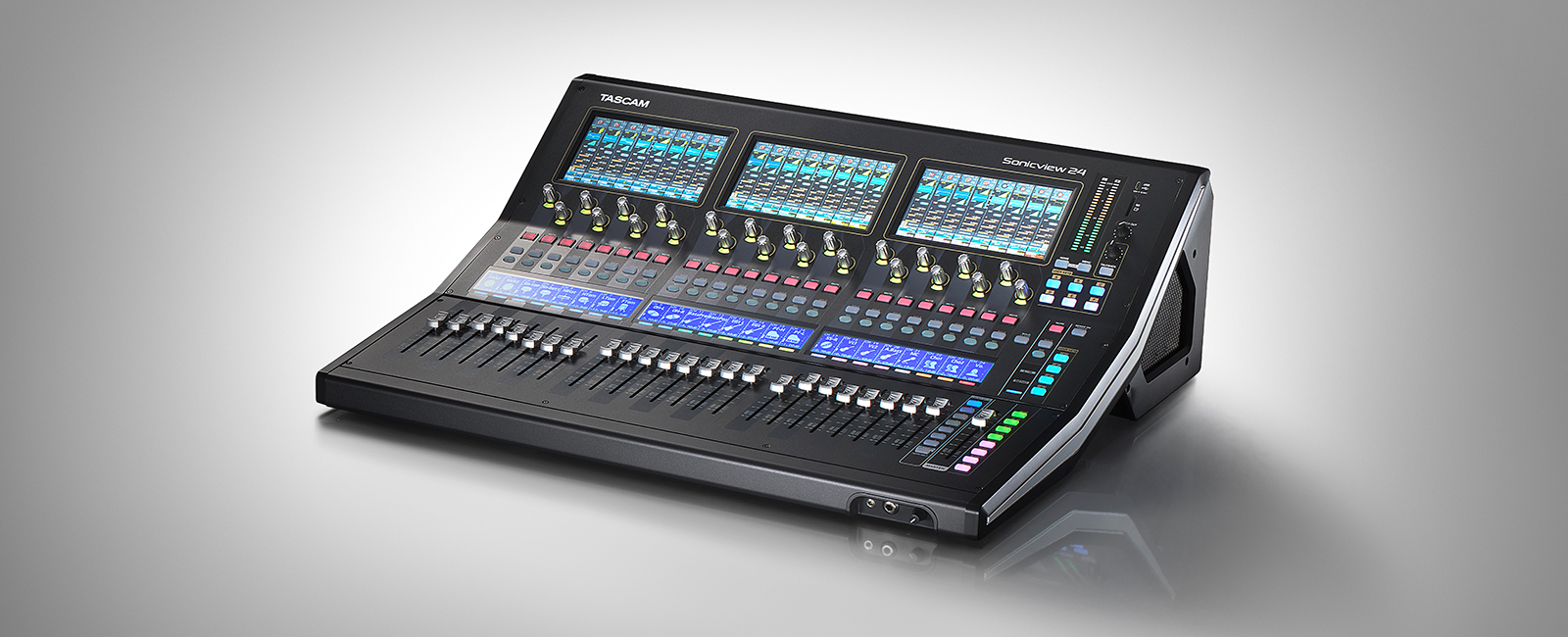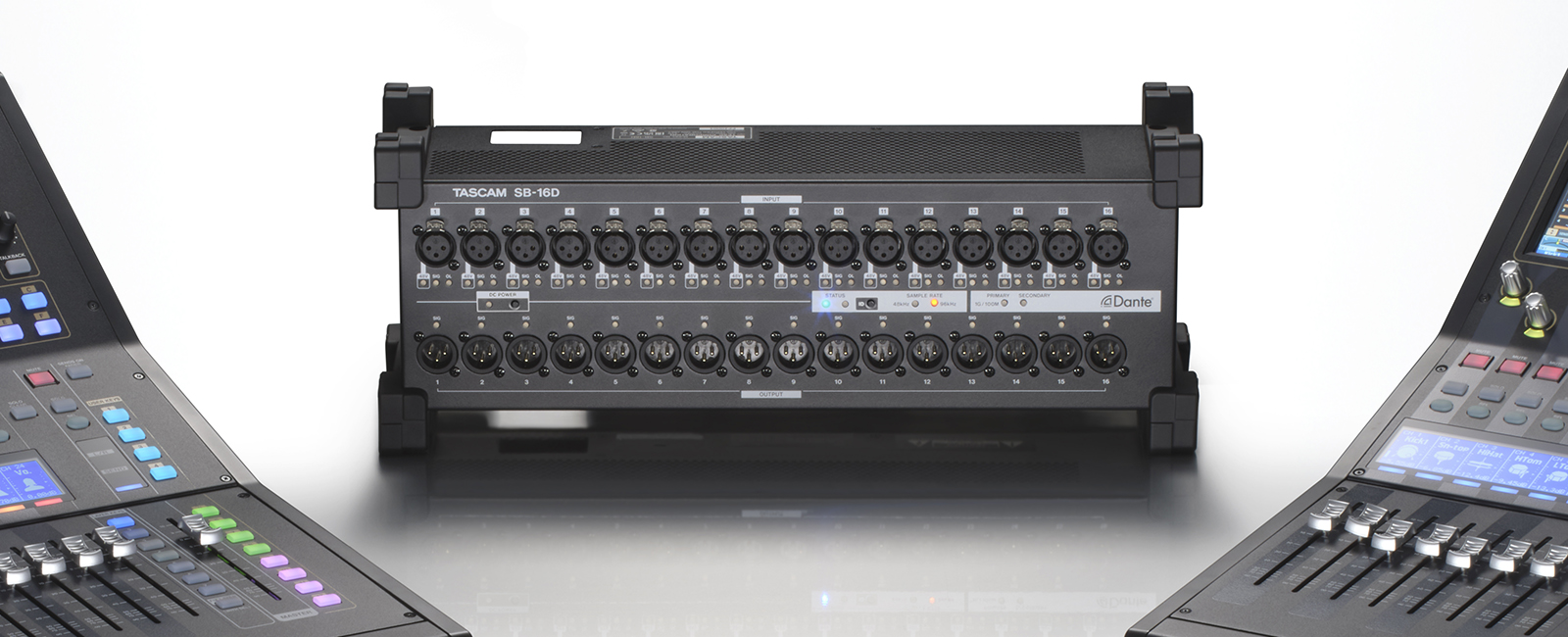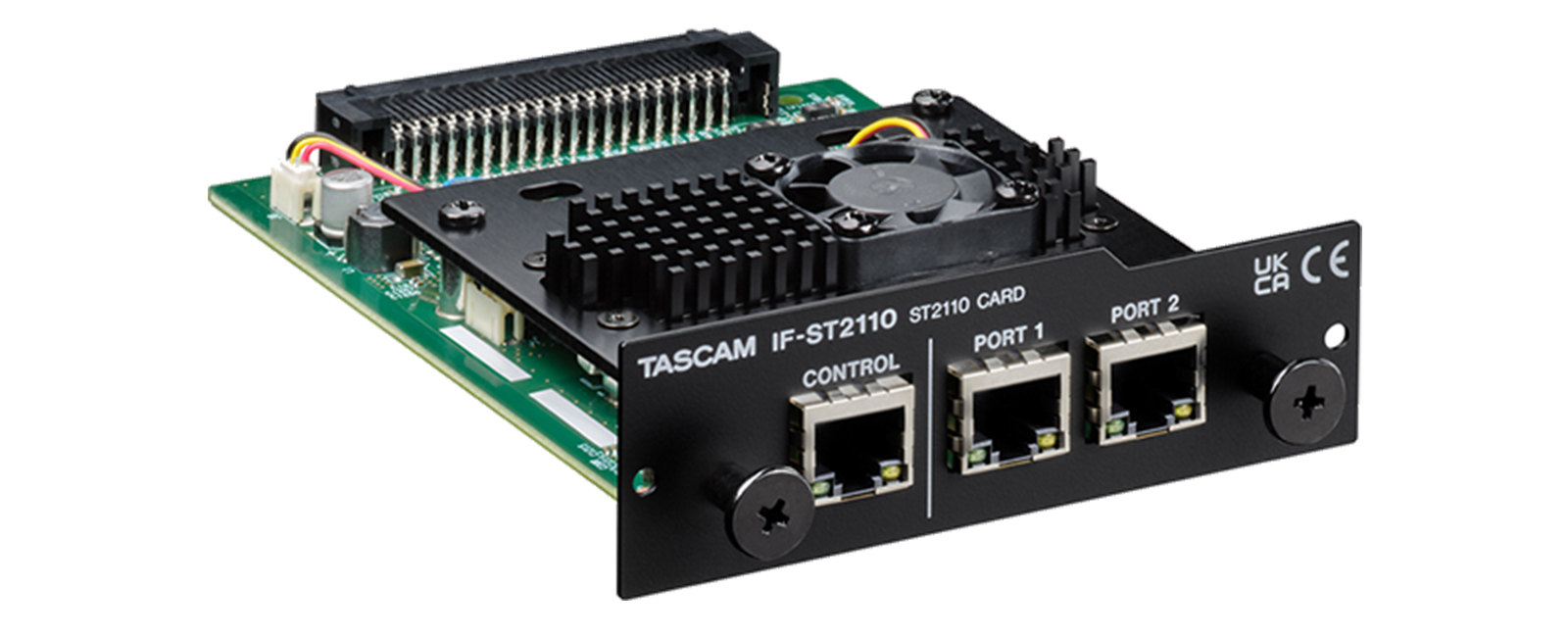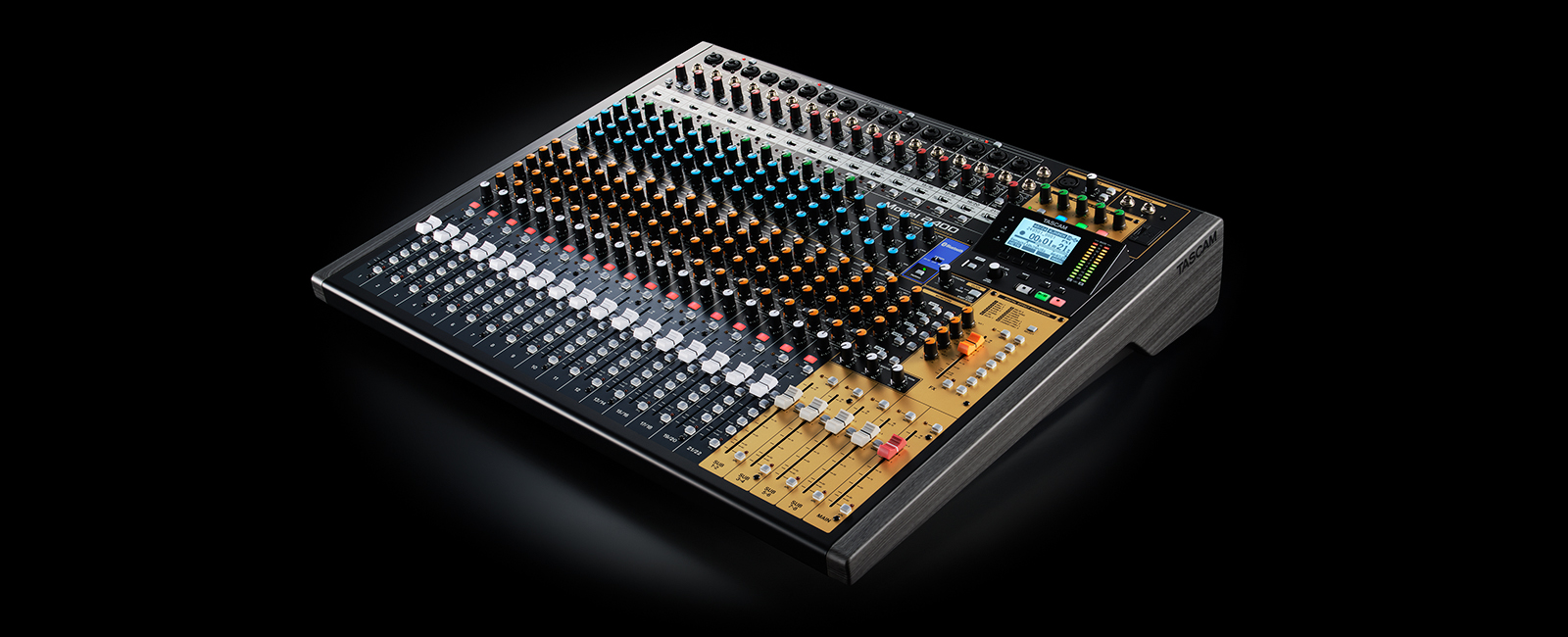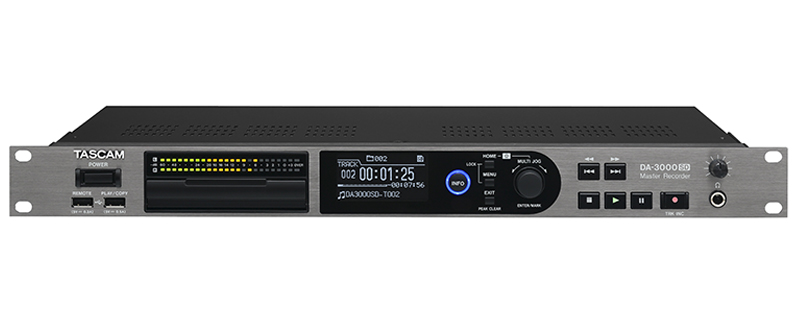TASCAM Sonicview 16 / TASCAM Sonicview 16dp
Digital Mixer with Multi-environment Touch Screens
- Dimensions : 472.0(W) x 228.1(H) x 554.4(D) mm
- Weight : 13kg
- Power consumption : 65W
- Dimensions : 472.0(W) × 228.1(H) × 554.4(D) mm
- Weight : 13kg
- Power consumption : 65W
- DC power redundancy built in (TASCAM Sonicview 16dp only)
- TASCAM VIEW (Visual Interactive Ergonomic Workflow) interface supports intuitive operation with three different view system
- 44 input channels (or 40 mono input channels and 2 stereo input channels) and 4 FX return
- 22 flexible output buses and main L/R bus with 31-band graphic EQ
- 96 kHz, 54-bit float-point FPGA mixing engine
- Ultra-low latency: 2 x samples (20.8µS) in mixing engine, 0.51 ms analog-to-analog
- 32-in/32-out, 32-bit/96 kHz USB audio interface
- 64-in/64-out built-in Dante interface; supports redundancy and DDM, AES67 and SMPTE ST 2110 interoperability
- 16 mic/line inputs (up to +32 dBu), 16 XLR line outputs with flexible routing
- TASCAM Sonicview 16 x 1
- Power cord (JAPAN/USA/EUROPE/OCEANIA) x 3
- Owner's Manual with Warranty x 1
- TASCAM ID Registration Guide x 1
- Stylus Pen x 1
- TASCAM Sonicview 16dp x 1
- AC Adapter (PS-P2450) x 1
- Power cord (JAPAN USA/EUROPE/OCEANIA) x 6
- Owner's manual with warranty x 1
- TASCAM ID registration guide x 1
- Stylus Pen x 1
Line up
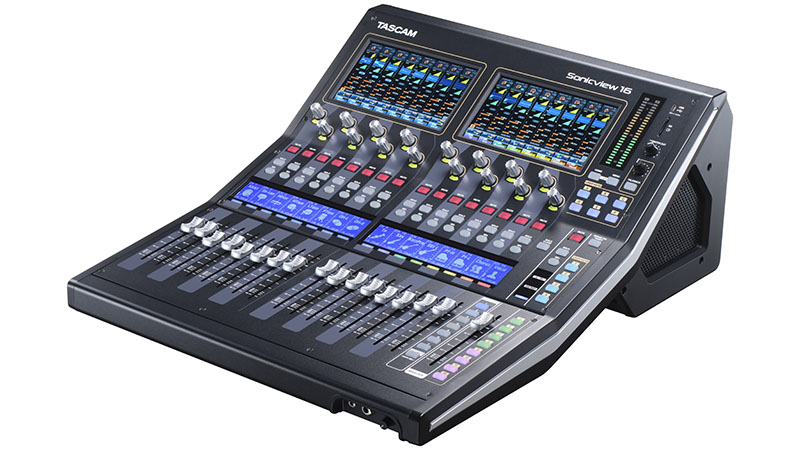 TASCAM Sonicview 16
TASCAM Sonicview 16
Single AC Powered Built in Model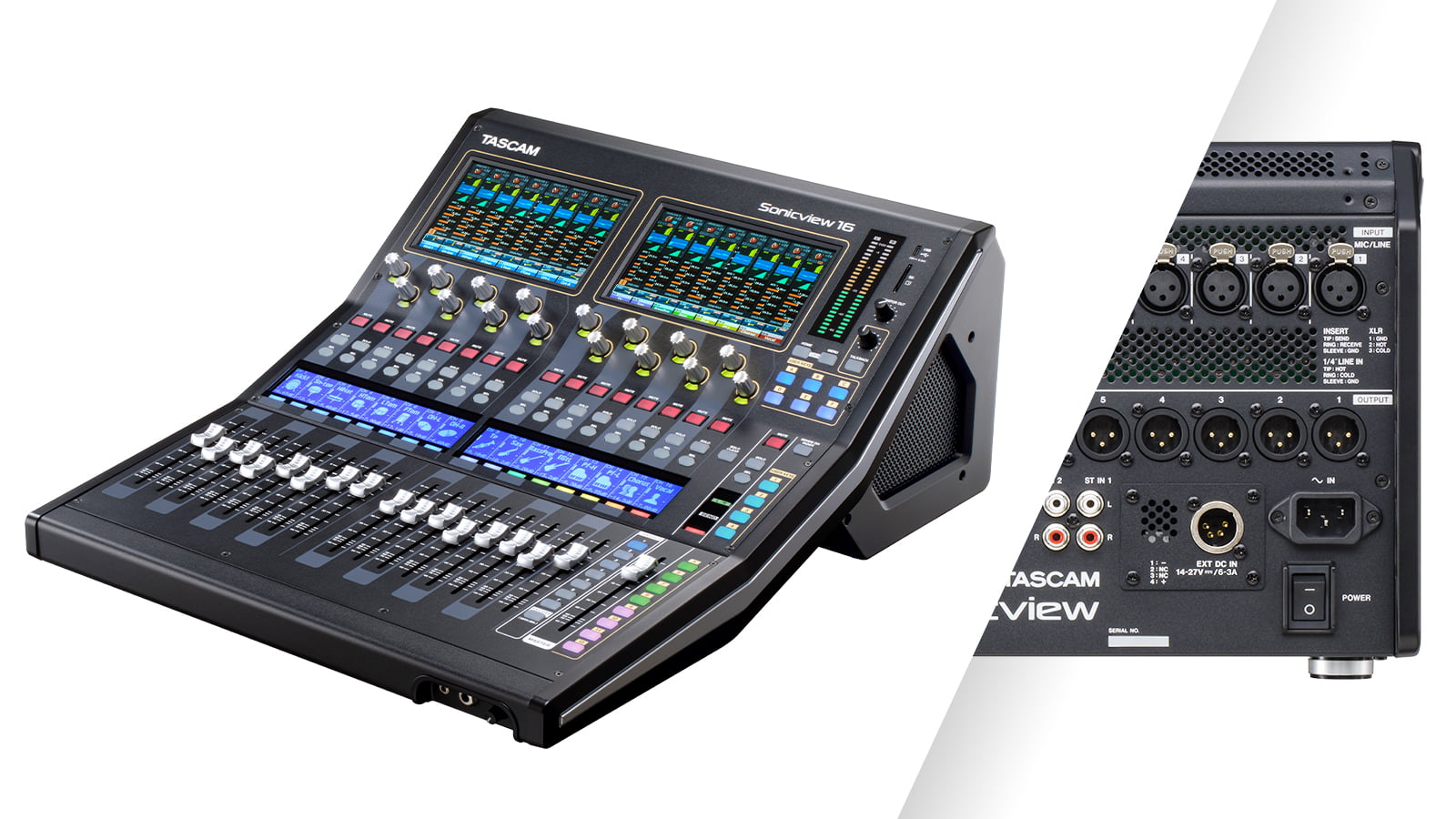 TASCAM Sonicview 16dp
TASCAM Sonicview 16dp
DC Power Redundancy Built in Model
What's Hot
Personal Monitor Control with Mixing Station App
Take the reins on stage and control your personal mix with Sonicview and the Mixing Station app. Performers can run up to 12 validated app instances - each with full control and real-time metering. Need more? Additional devices can still connect for control, though metering is limited to the first 12. Adjust EQ, levels, aux sends, and more - all from the palm of your hand.
* Compatible with Sonicview V2.2.3 or later.
The Mixing Station app can be purchased and downloaded at:
https://mixingstation.app/
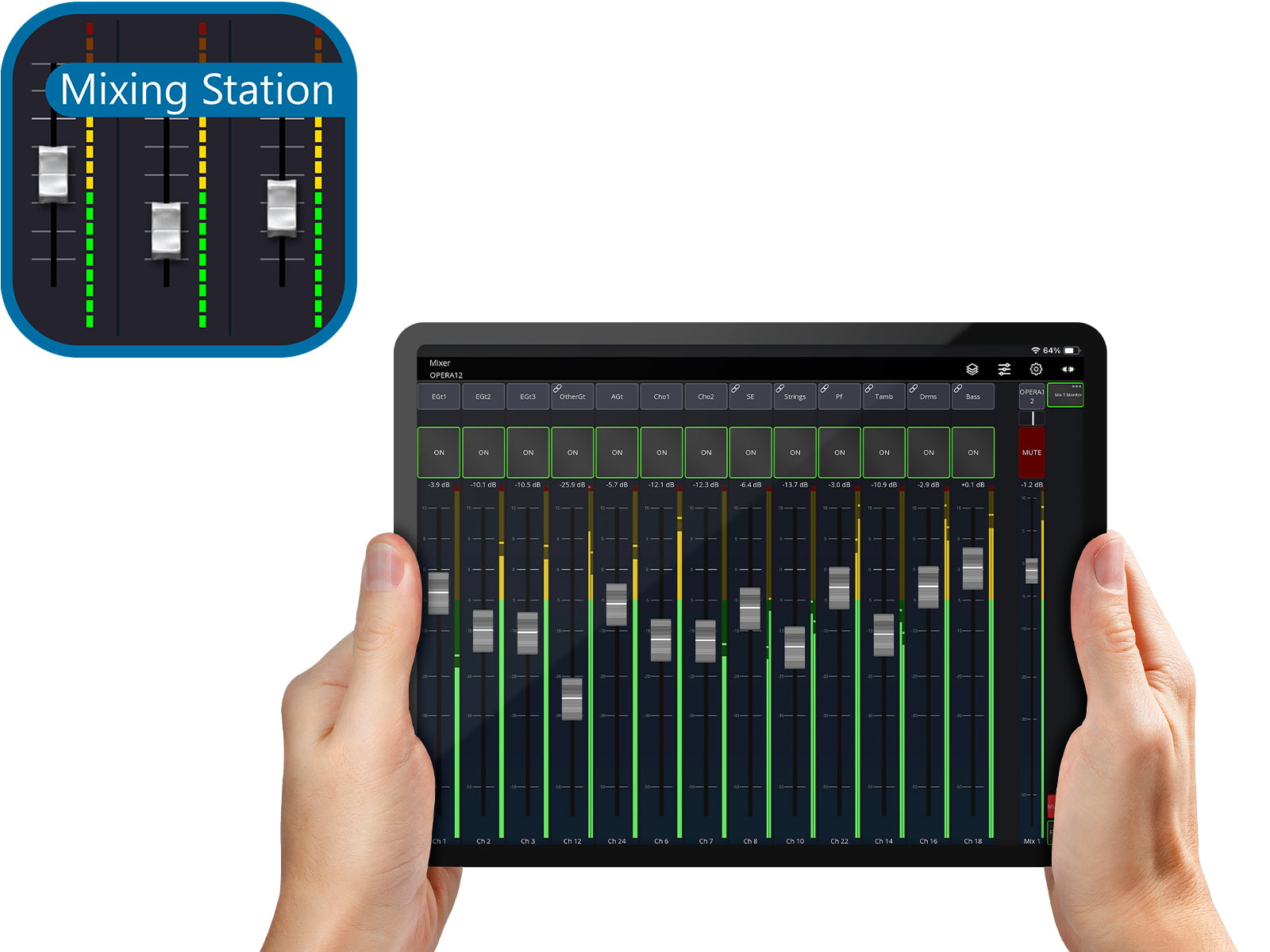
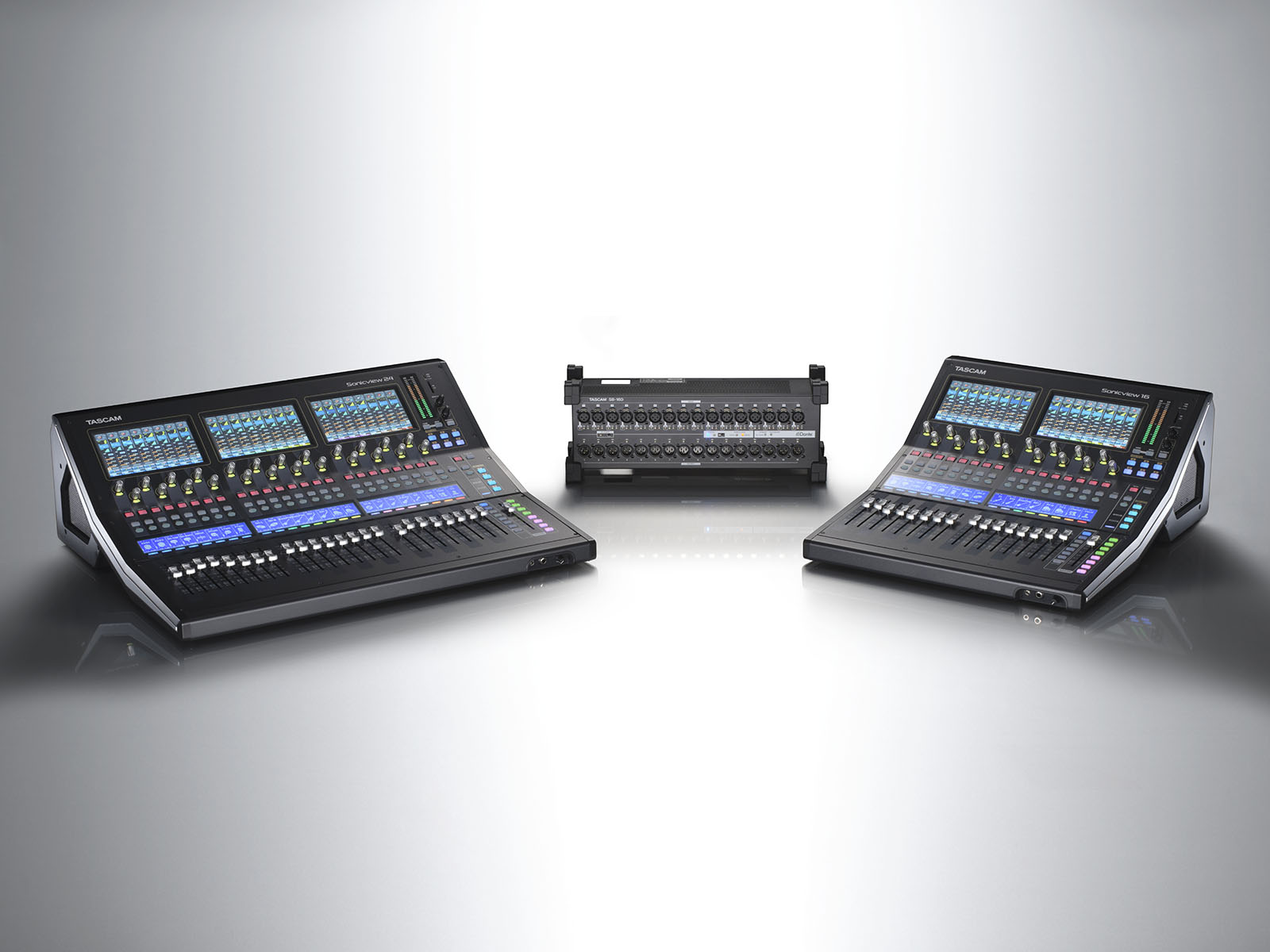
TASCAM has a long history of high-quality digital mixers, culminating with the legendary DM-4800, a workhorse mixer that set a new standard. With TASCAM Sonicview, TASCAM has created an entirely new line of digital mixing consoles that incorporate the latest technology and make it easy to see and control all of the parameters you want, when you want, with completely customizable touch screens and user-definable buttons, along with motorized faders and intuitive control software.
TASCAM Sonicview mixing consoles integrate beautifully with the rest of your system, thanks to built-in Dante networking, a 32-bit/96 kHz multi-channel USB audio interface, and plenty of I/O. No-compromise audio quality, including 54-bit float-point FPGA mixing, combines with ample signal processing, an expansion slot for additional connectivity, and wireless remote control to make TASCAM Sonicview mixers a next-generation choice for touring, installed sound, recording studios, and broadcasting.
Intuitive Operation at Your Fingertips
The TASCAM Sonicview 16 offers motorized channel faders in two banks of eight, plus a motorized stereo fader for the main bus. Above each bank of channel faders is a color touch panel that allows you to view entire mixer channels, or get down to details, controlling each parameter with your fingertip.
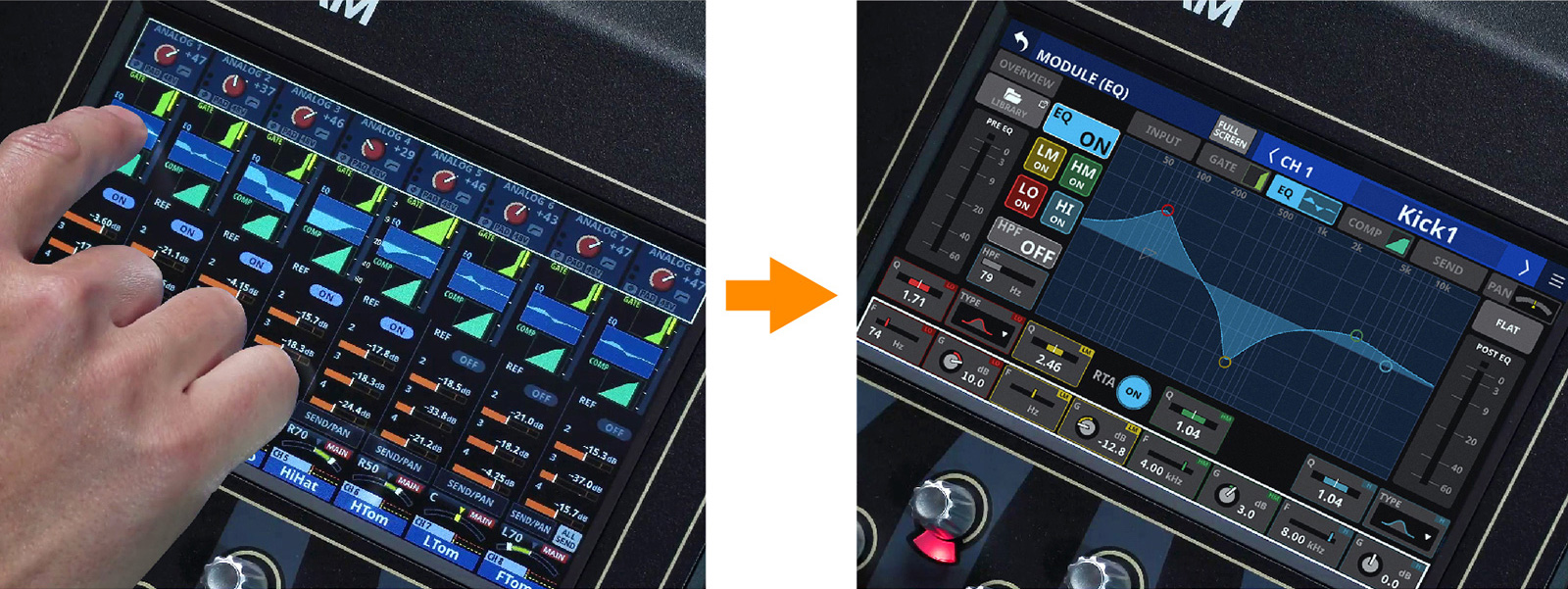
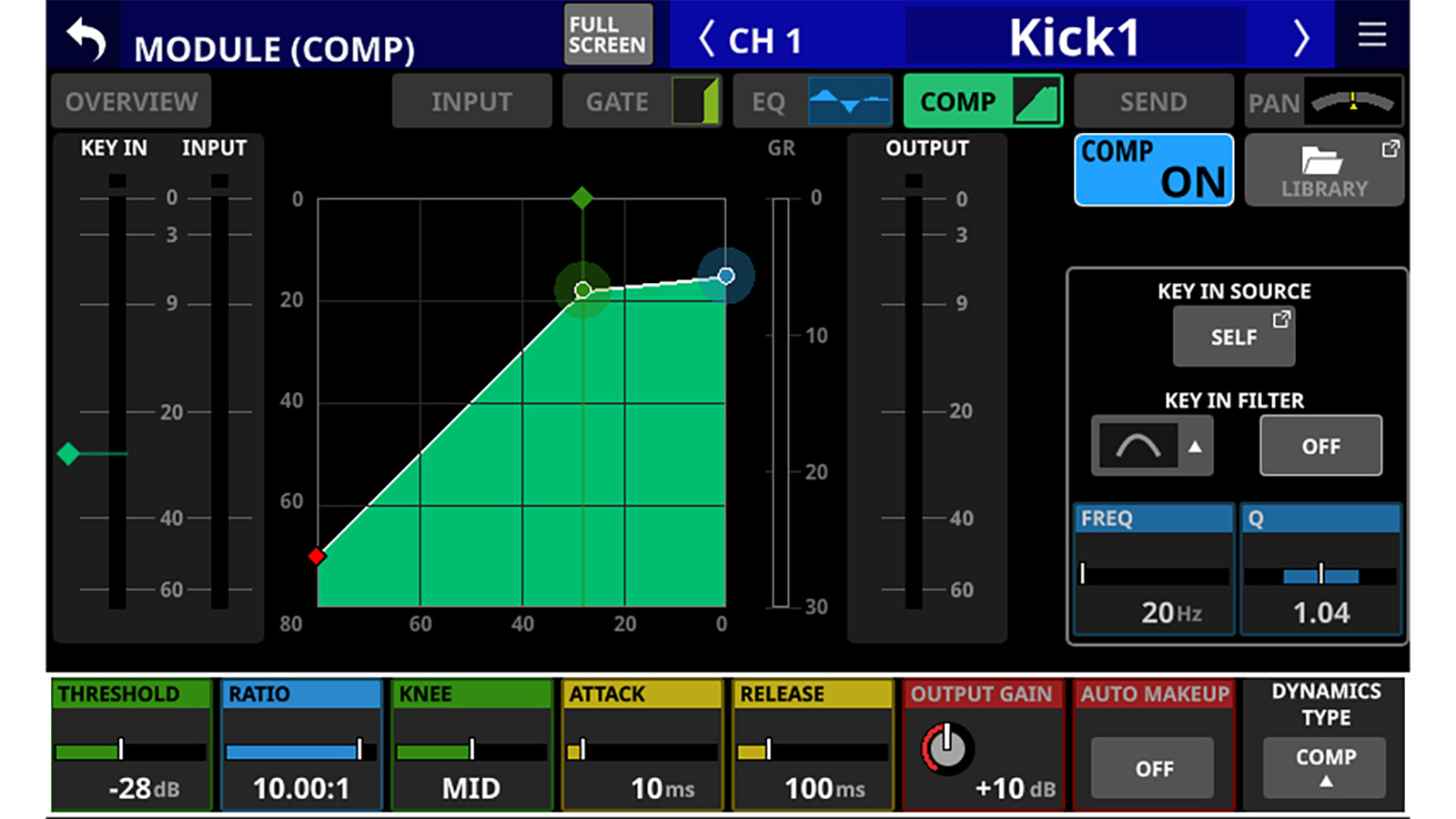
The Amazing VIEW
Truly the next generation in mixer user interfaces, the powerful intuitive TASCAM Visual Interactive Ergonomic Workflow (VIEW) system lets you quickly and easily configure the TASCAM Sonicview 16's two touch screens.

Thanks to the VIEW user interface, there are three different ways to view your settings, and each touch screen can be configured independently, so you can monitor and control any combination of settings you want, in whichever screens you want, whenever you want. For instance, you could monitor levels for eight channels of vocals on screen 1, while tweaking the parametric EQ on a drum submix on screen 2.
- To view the status of any eight adjacent channels at a glance, as you would see on vertical channel strips with an analog mixer, choose Channel Strip View.
- In Module View, you can monitor and control any two sets of parameters for one single channel, including the compressor, graphic EQ, effects send, and more.
- Individual View is the ultimate in customized displays. View any functions for any channel, group of channels, and more—all on different screens, simultaneously. For instance, you could simultaneously monitor the output bus meter on screen 1, and monitor levels on important input channels on screen 2.
Channel Strip View
Channel Strip View lets you monitor and control eight adjacent channels, and view them as virtual channel strips like an analog mixer layout.
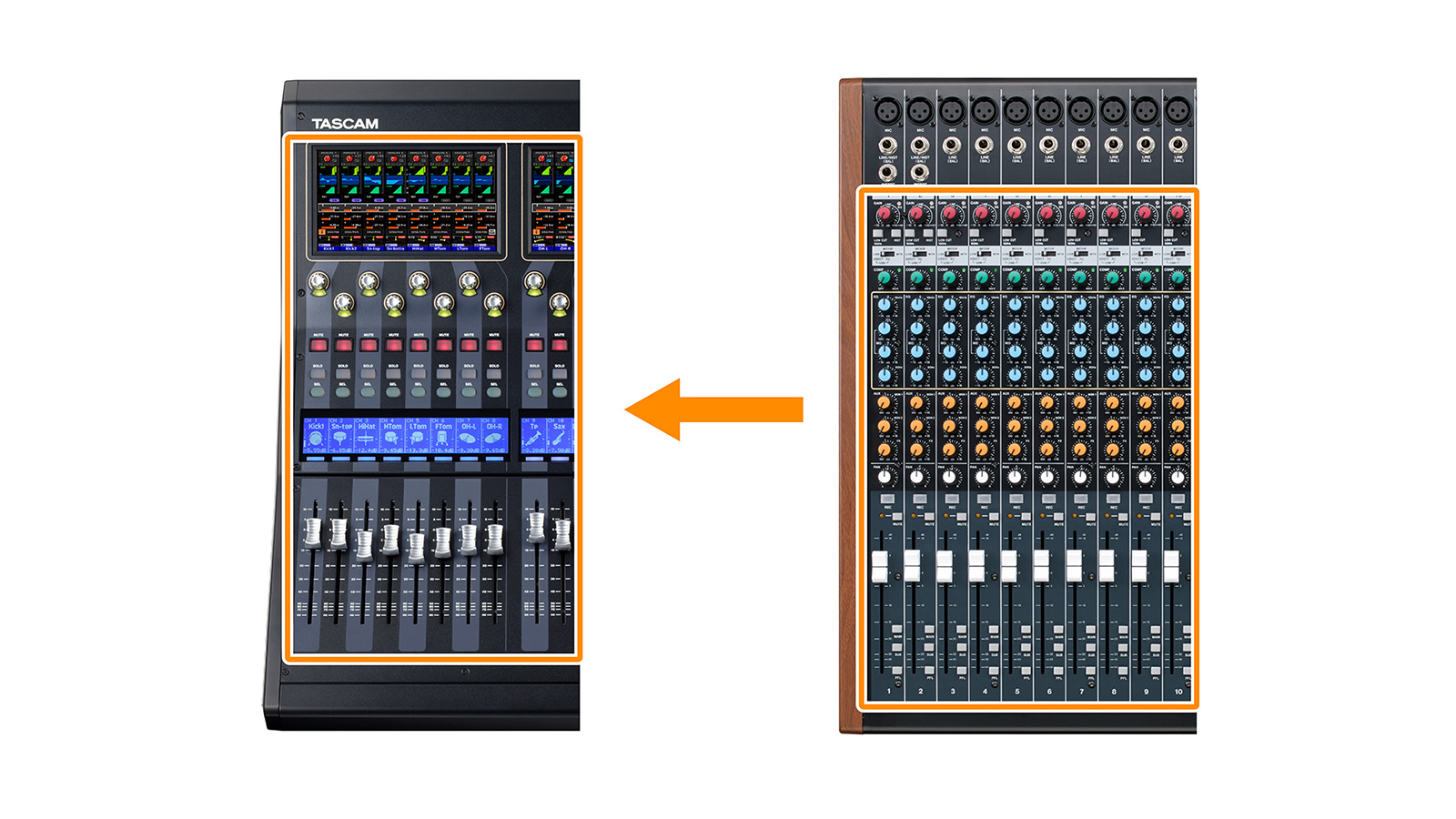
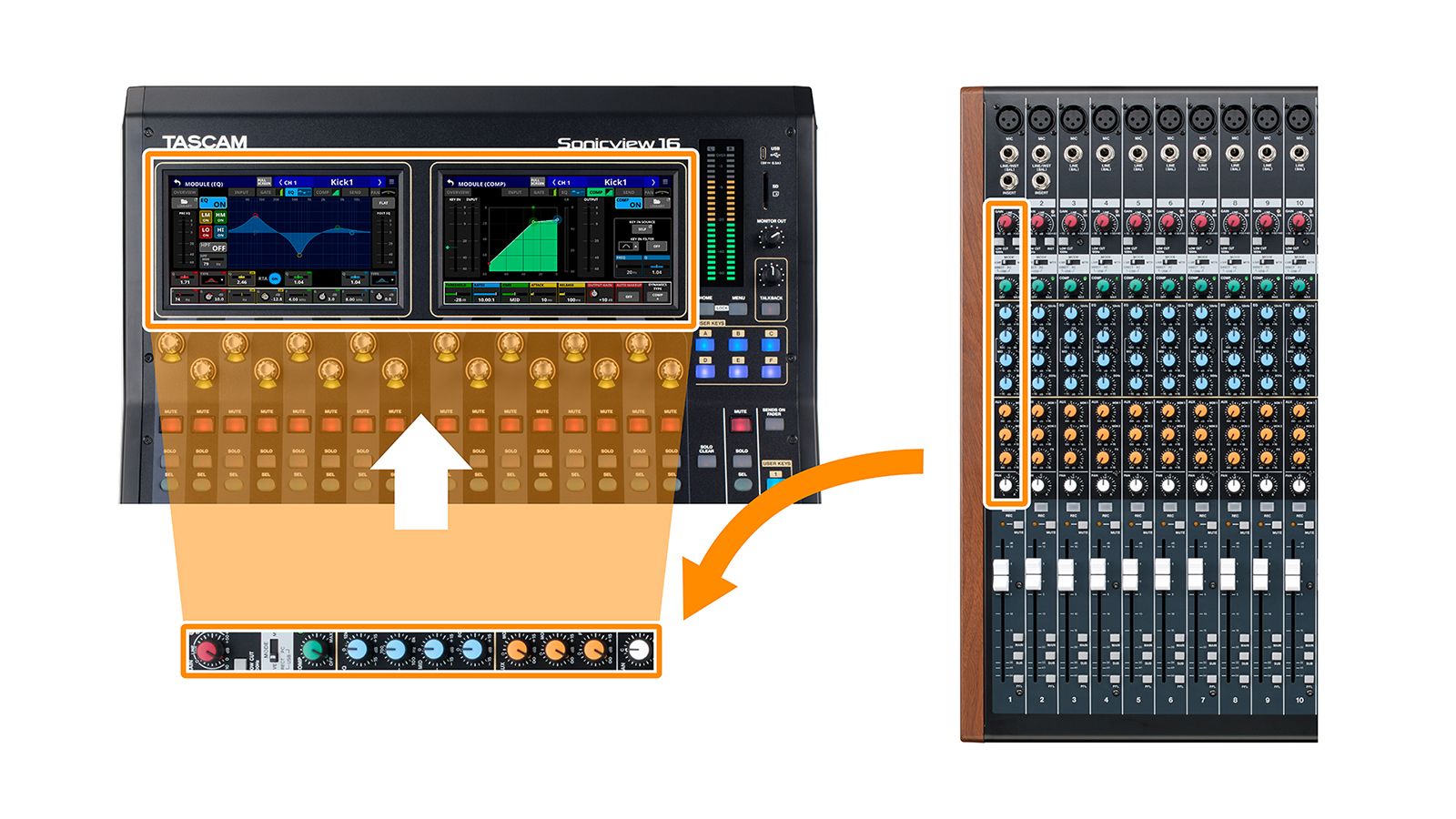
Module View
Module View lets you monitor and control any two sets of parameters simultaneously for one single channel.
Individual View
Individual View lets you monitor and control a custom selection of functions for any channel or group of channels.
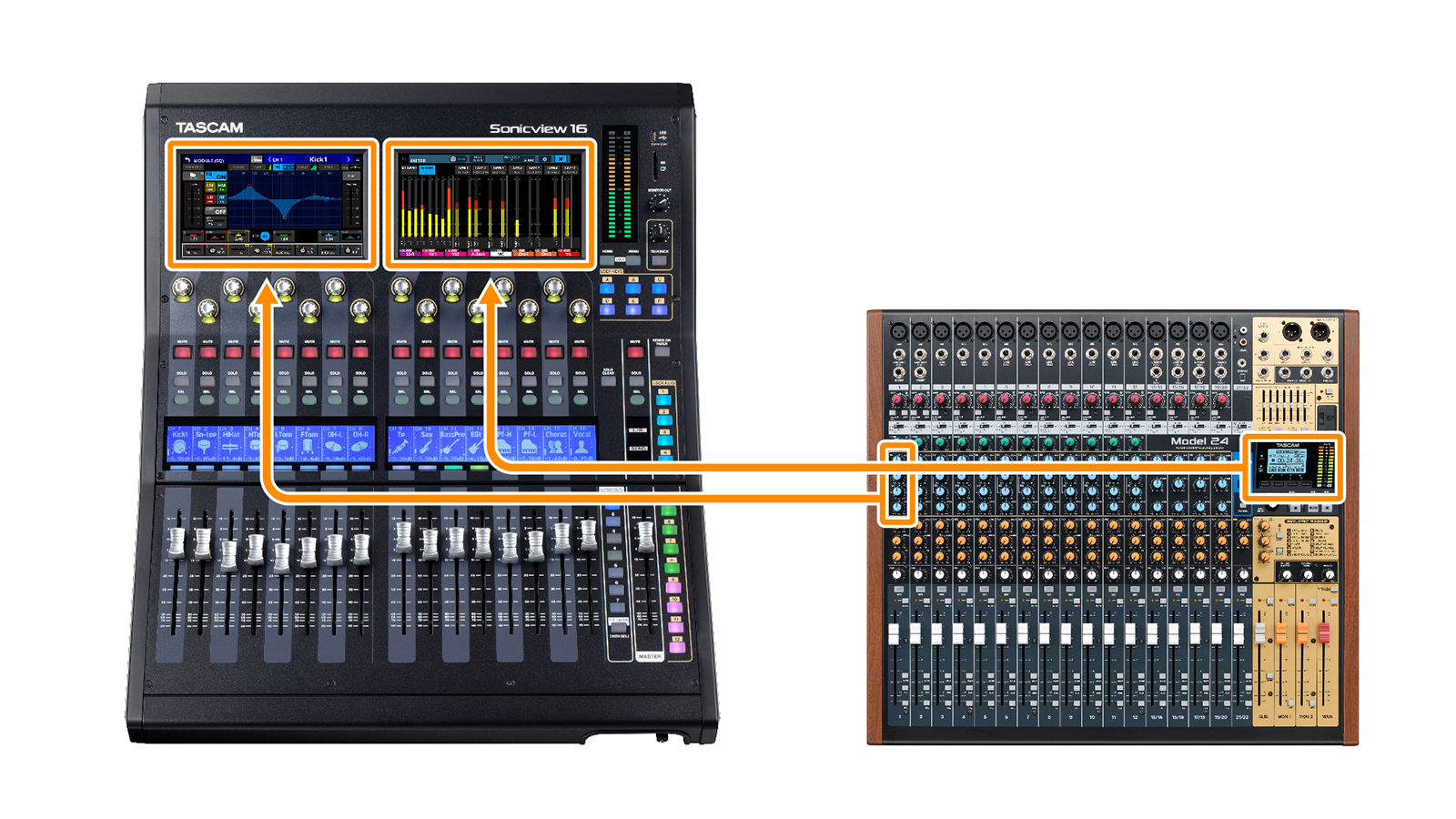
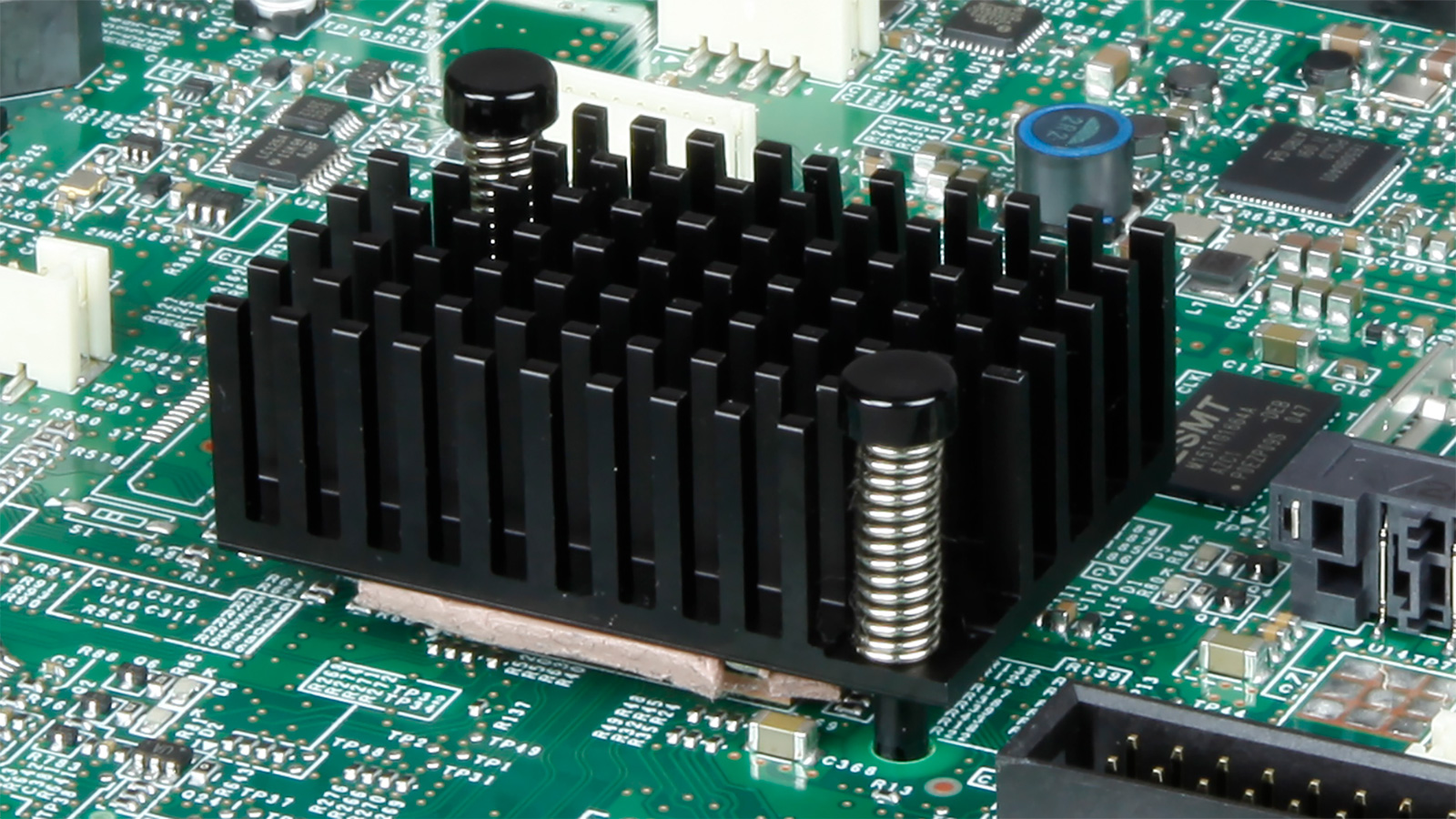
High-end Audio Quality
TASCAM Sonicview delivers the finest audio performance in its class, thanks to a 54-bit float-point FPGA mixing engine; continuous, high-definition 32-bit/96 kHz sampling; and 32-bit analog-to-digital converters. The mixing engine's float-point processing makes it possible to flexibly change levels without compromising resolution and FPGA mixing engine make it possible to ensures ultra-low latency, even in analog-to-analog connections. The result is no-compromises performance, including with Dante networks and in-line monitoring systems.
Click for more on FPGA mixing engine, 54-bit float-point processing and 96kHz processing
Input Channels and Processing
The TASCAM Sonicview 16 offers 16 channels with XLR mic/line inputs or 8 channels with both XLR mic inputs and balanced TRS line inputs. You also get TRS insert points on two channels, two stereo pairs of RCA aux inputs, and an XLR input for a talkback mic.
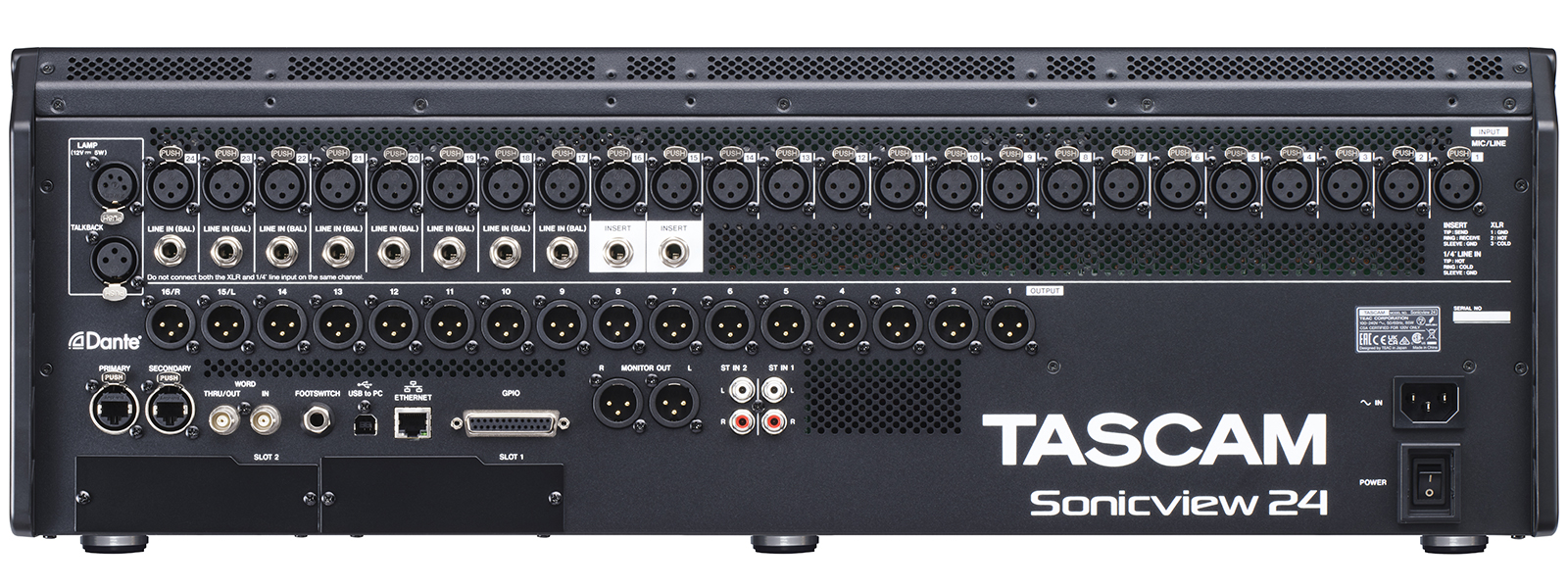
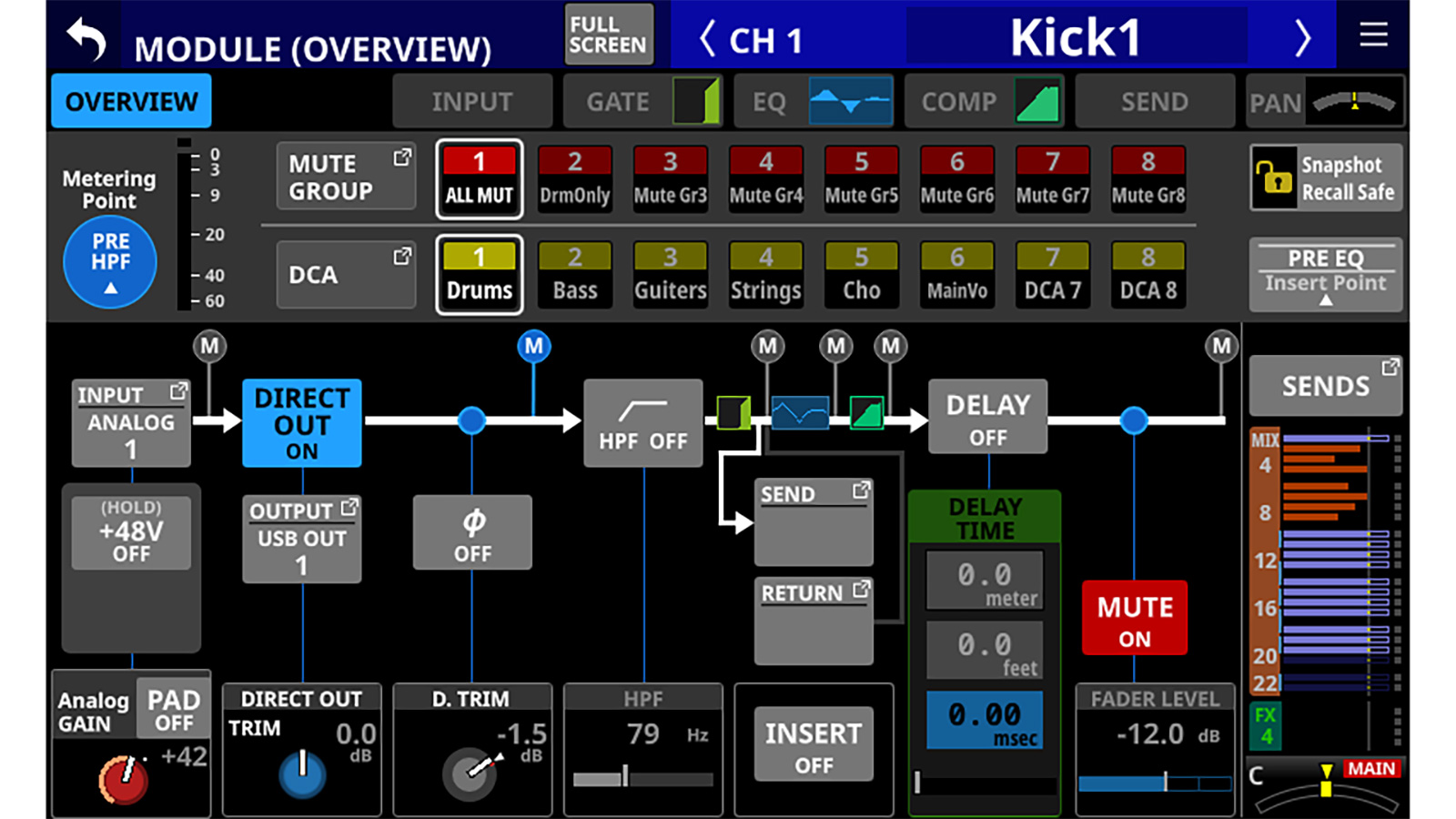
Channel Control and Processing
There's much more to TASCAM Sonicview than meets the eye. Internally, TASCAM Sonicview mixers have a generous 40 mono channels, 2 stereo and 4 stereo FX return channels channels so you can fly in backing tracks to make a small praise band sound huge, accommodate additional physical audio inputs via the expansion slots for larger ensembles, manage sources from every part of a venue via the Dante network, and mix dozens of DAW tracks. Eight DCAs enable you to easily control groups of channels. The programmable layer keys select which custom combination of channels and output buses are controlled by the motorized faders.
Each input channel can use any or all of 11 processing functions, which can be independently set:
| Delay (Input/Pre-fader) | Phase | Digital Trim | High-pass Filter |
| Gate/Expander/De-esser | 4-band Parametric EQ | Compressor/Ducker | Solo |
| Mix 1-22 Send/Pan (Pre/Post) | FX 1-4 Send/Pan (Pre/Post) | Fader/Pan/Mute to L/R |
Top-of-the Line Class 1 HDIA Mic Preamps
Each TASCAM Sonicview microphone input feeds a TASCAM Class 1 HDIA (High Definition Instrumentation Architecture) preamp—the finest mic preamp we've ever made. Thanks to an instrumentation amplifier with extremely good noise characteristics in the first stage, Class 1 HDIA microphone preamps exhibit excellent EIN, signal-to-noise ratio, distortion ratio, and frequency response. TASCAM Sonicview ultra definition mic preamps will pick up the slightest nuance from rosin on a violin bow to the subtle dynamic changes of a voice or saxophone. The mic inputs can accept up to +32 dBu signals, providing plenty of headroom for sudden level increases.
The combination of Class 1 HDIA preamps, 32-bit/96 kHz ADCs, and our 54-bit FPGA mixing engine is impressive but we didn't stop there: We conducted extensive internal and external evaluations to tune TASCAM Sonicview mixers for optimal performance. The result is best-in-class sound that will never disappoint.

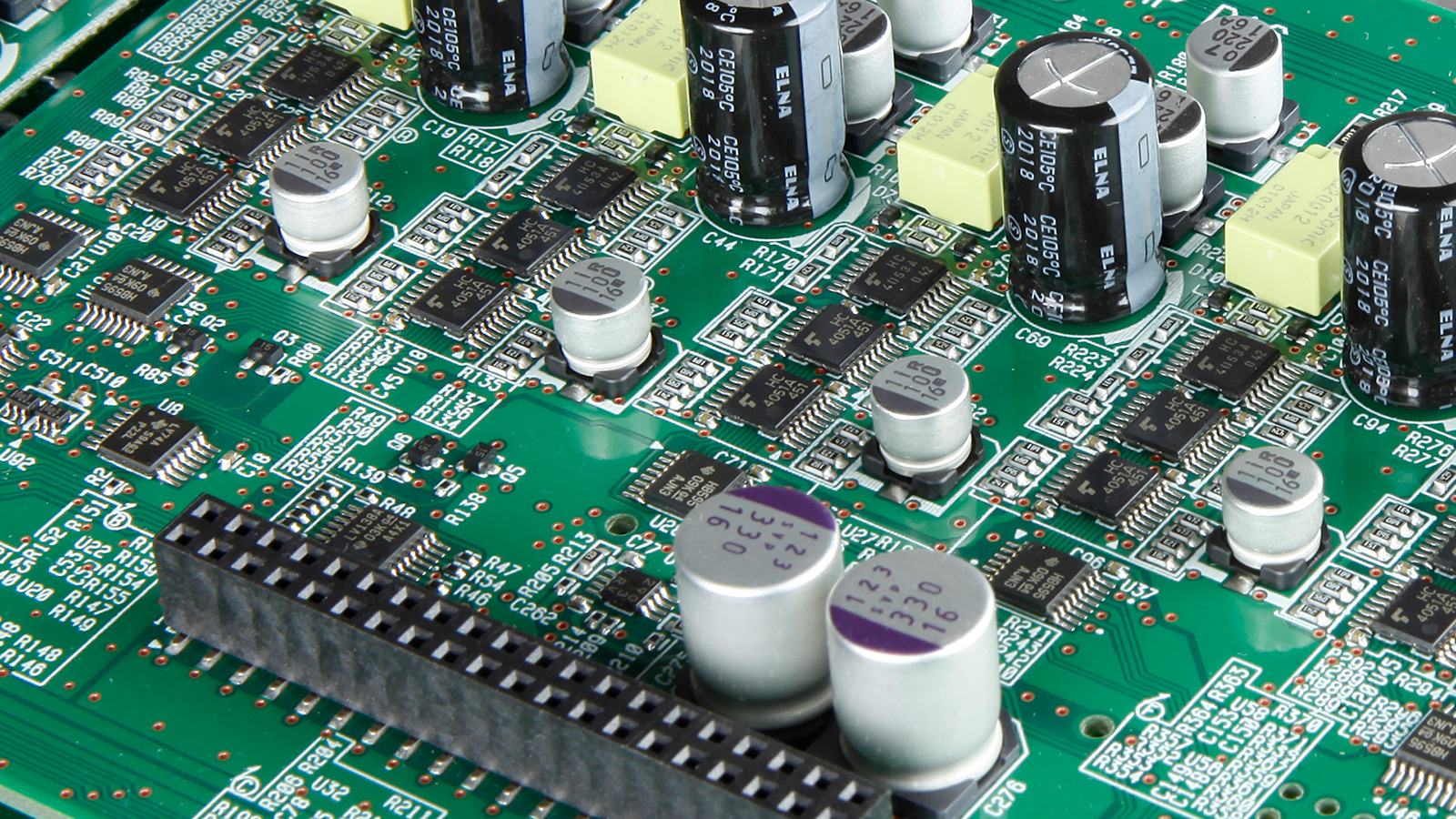
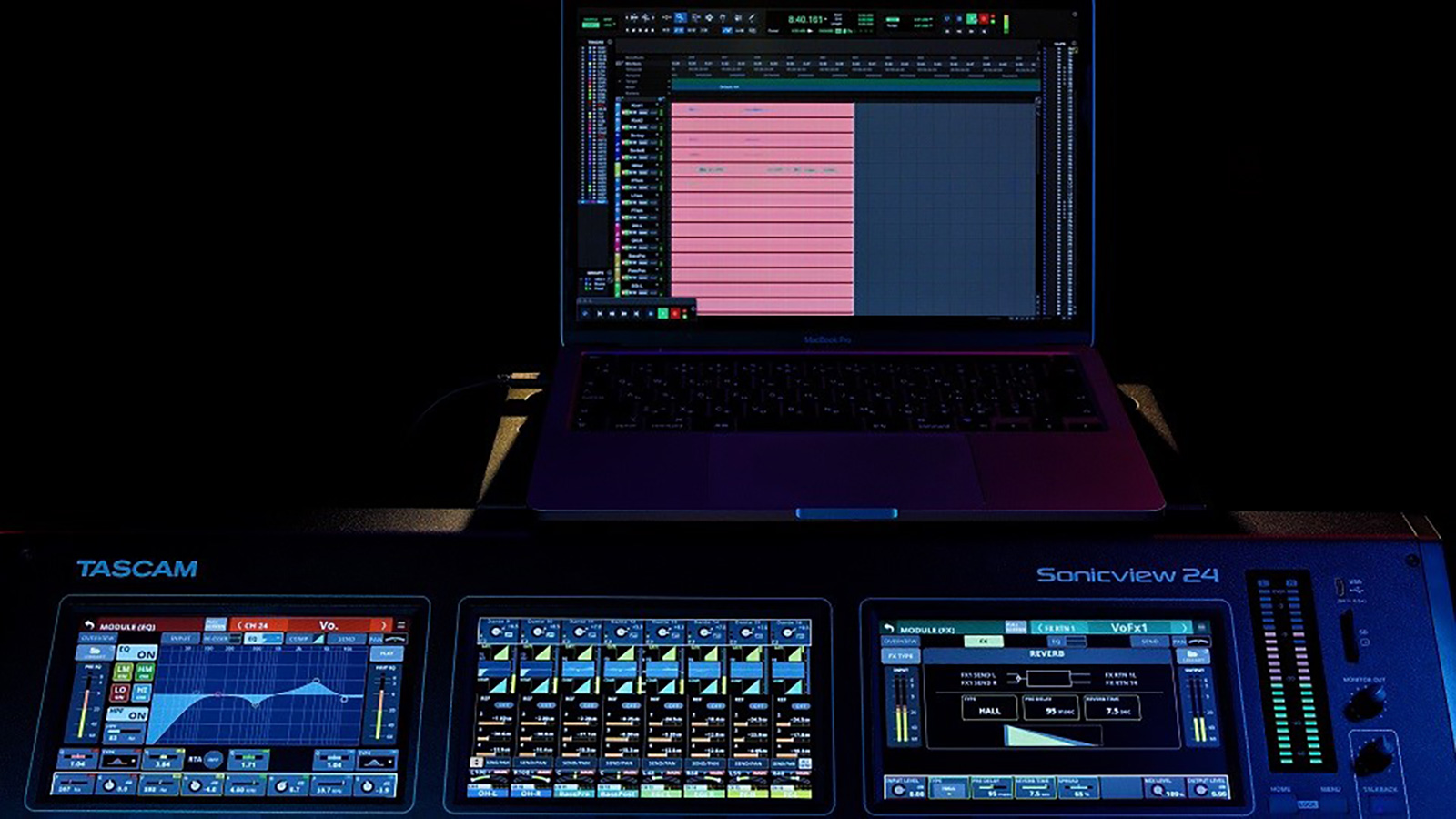
Built-in USB Audio Interface and Stereo Recording
TASCAM Sonicview's integrated 32-in/32-out USB audio interface makes it a first-rate front end for recording and broadcast studios, as well as for capturing live events. Record your choice of channel direct outs, flex buses, and the L/R main bus to your favorite DAW at up to 96 kHz with the same 32-bit precision used throughout the TASCAM Sonicview.
You can simultaneously capture the main mix directly to the onboard stereo SD/USB recorder — handy when the band wants to listen to their performance at the hotel or on the bus. A top-panel port also lets you record in stereo to a USB flash drive.
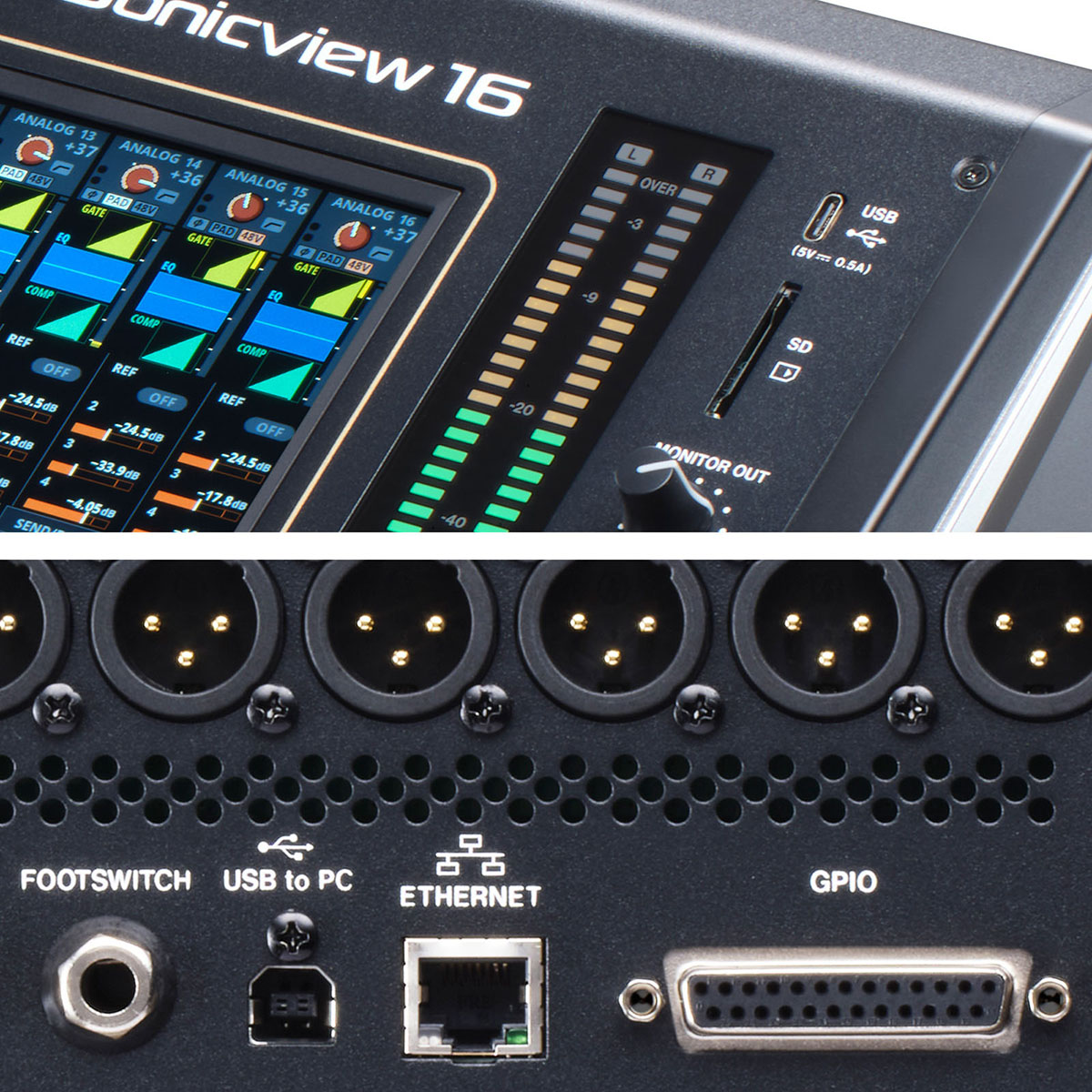
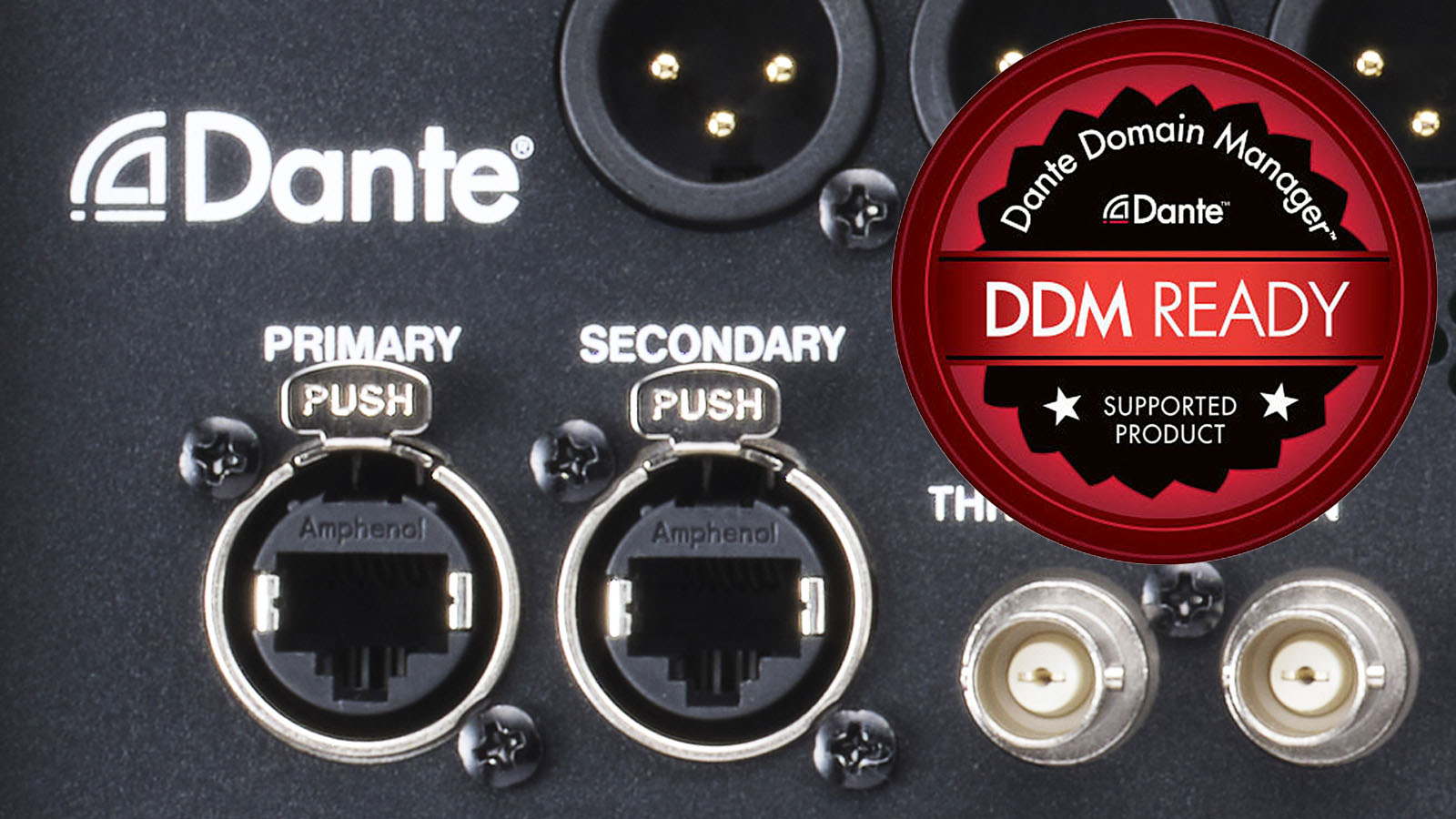
Dante-enabled for Superior Networking
Dante® audio-over-IP networks integrate thousands of concert touring systems, as well as installed systems in recording studios, radio stations, corporate boardrooms, houses of worship, and much more. TASCAM Sonicview consoles can serve as the audio center of these systems, thanks to a built-in 64-in/64-out Dante interface that supports Dante Domain Manager and have AES67 and SMPTE ST 2110 interoperability. Two Dante ports enable redundant streams.
Remote Control and Offline Editing
Whether onstage, backstage, in a control room, or at the rear of a concert hall, you're always in full control of your TASCAM Sonicview 16 mixer. Just connect a Wi-Fi router to the TASCAM Sonicview's Ethernet port and use free TASCAM Sonicview Control software for macOS, Windows, and iPadOS to manage your TASCAM Sonicview 16 from virtually anywhere in the venue. Edit settings offline in advance so you're ready to go when a session or show begins, then make adjustments from the console or from the software.
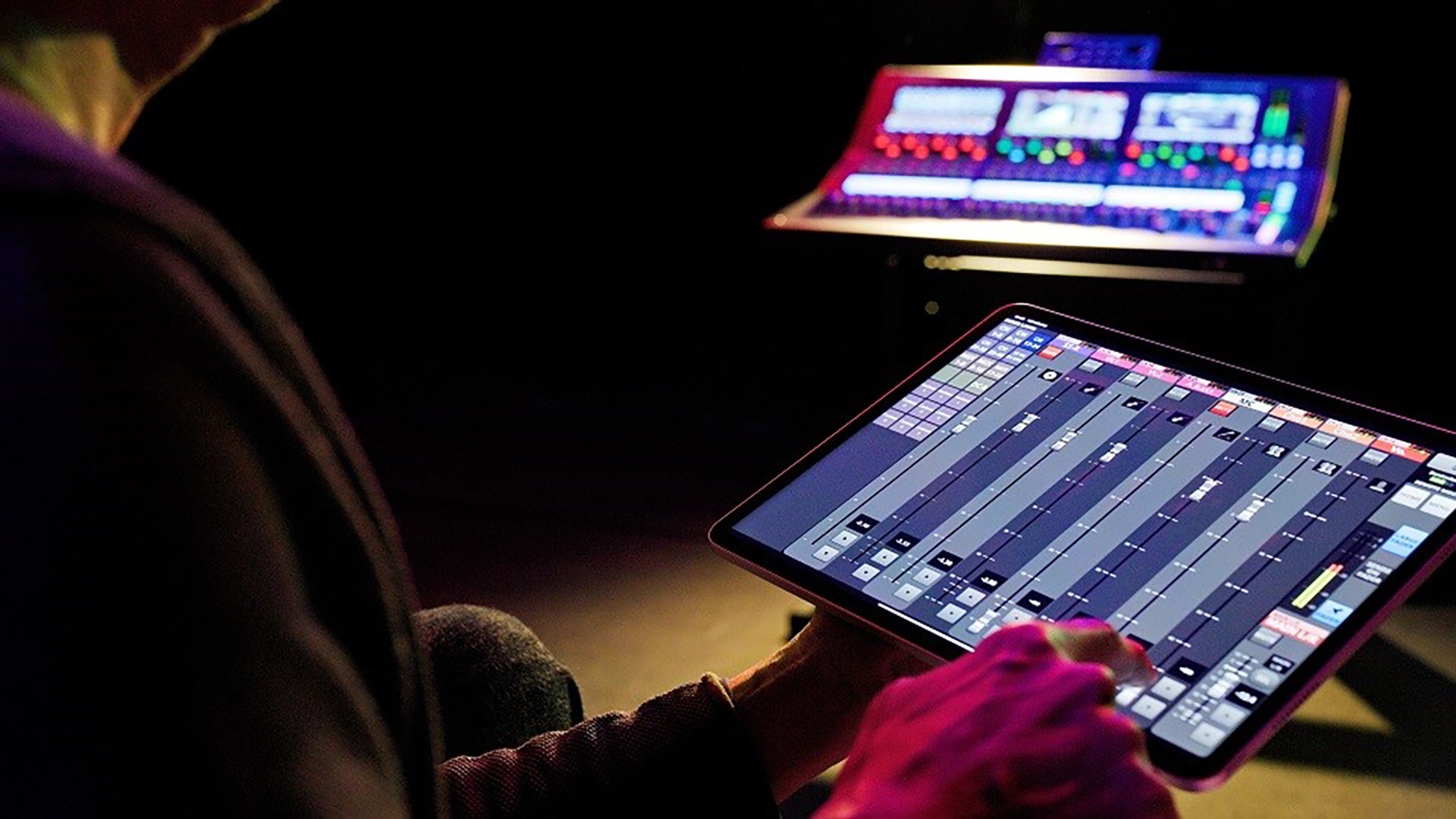
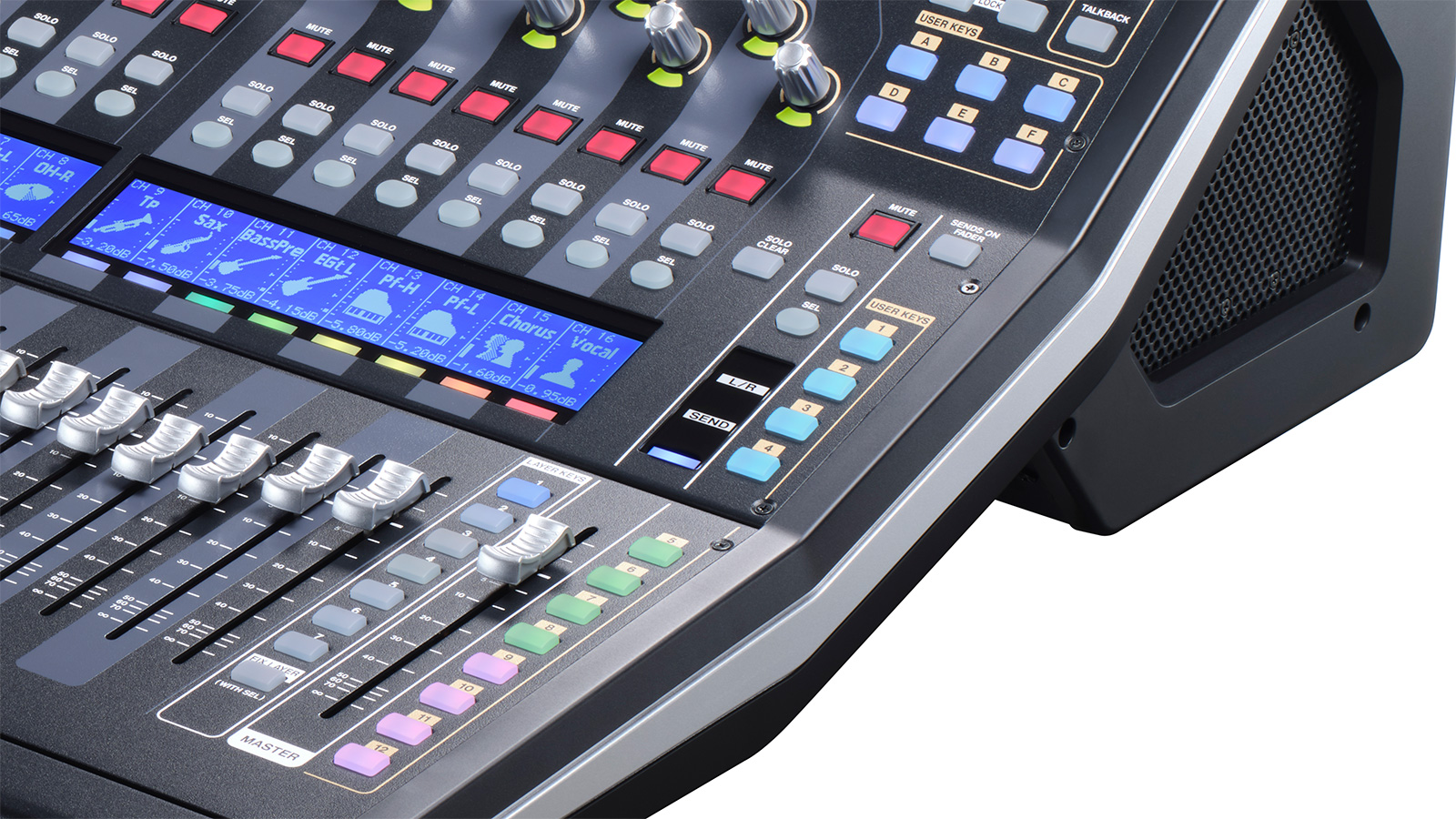
Work Quickly with Function Keys
TASCAM Sonicview offers intuitive, analog-like operation, while providing a variety of convenient digital functions that can be customized as needed. Eighteen user-defined function keys can be assigned to recording with the internal recorder, playback, and more. Several keys are conveniently preassigned to functions such as Sends On Fader and Snapshot Recall but you can reassign them as desired. A footswitch (not included) can be used to tap in delay-time settings.
Expanded User Keys & Configurable Library (supported in V2.2.0)
TASCAM Sonicview's User Keys now offer expanded functionality, with up to 64 additional keys accessible via the LCD screen. This enhancement delivers greater flexibility and more customization options for frequently used functions. The new User Defined Control Library makes it easy to store and recall multiple User key layouts, GPIO and Foot switch—ideal for switching between different workflows, users, or production scenarios.
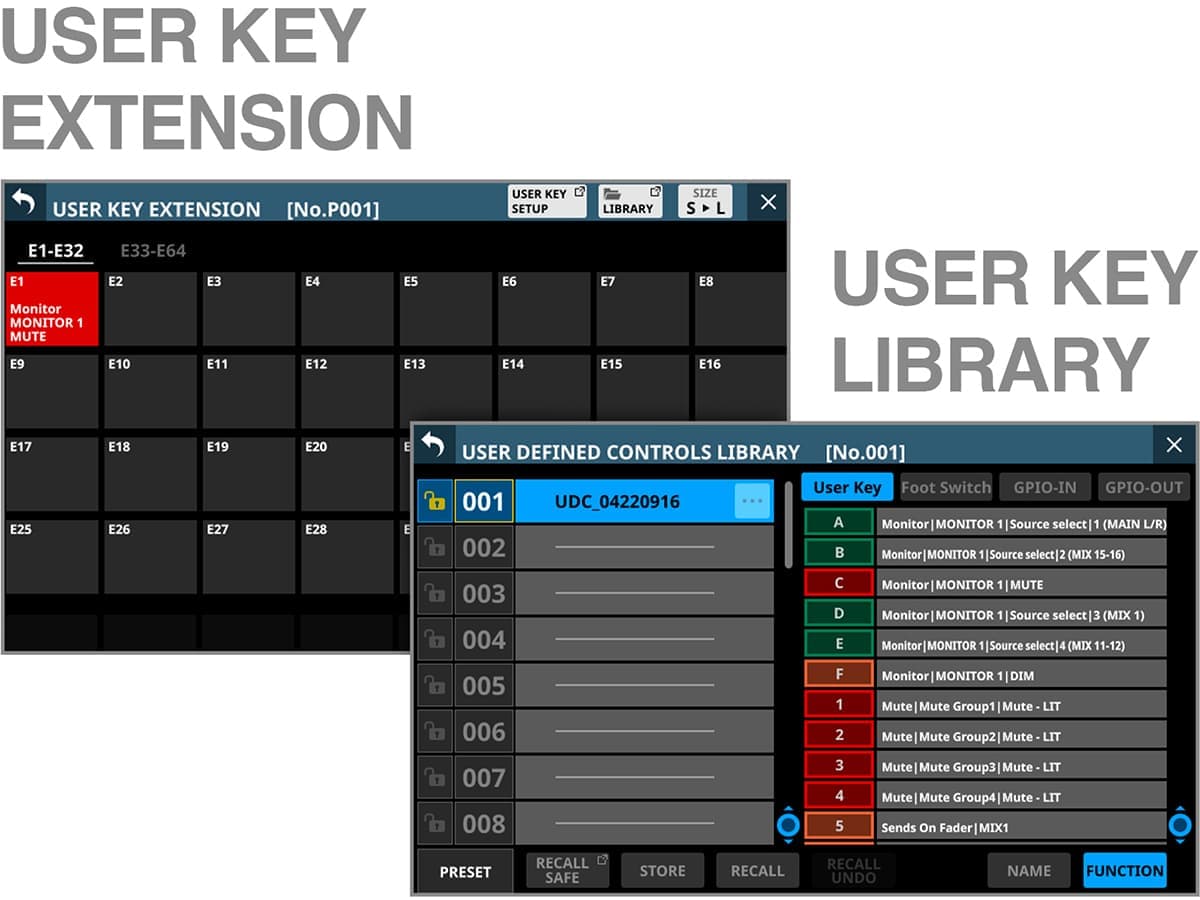
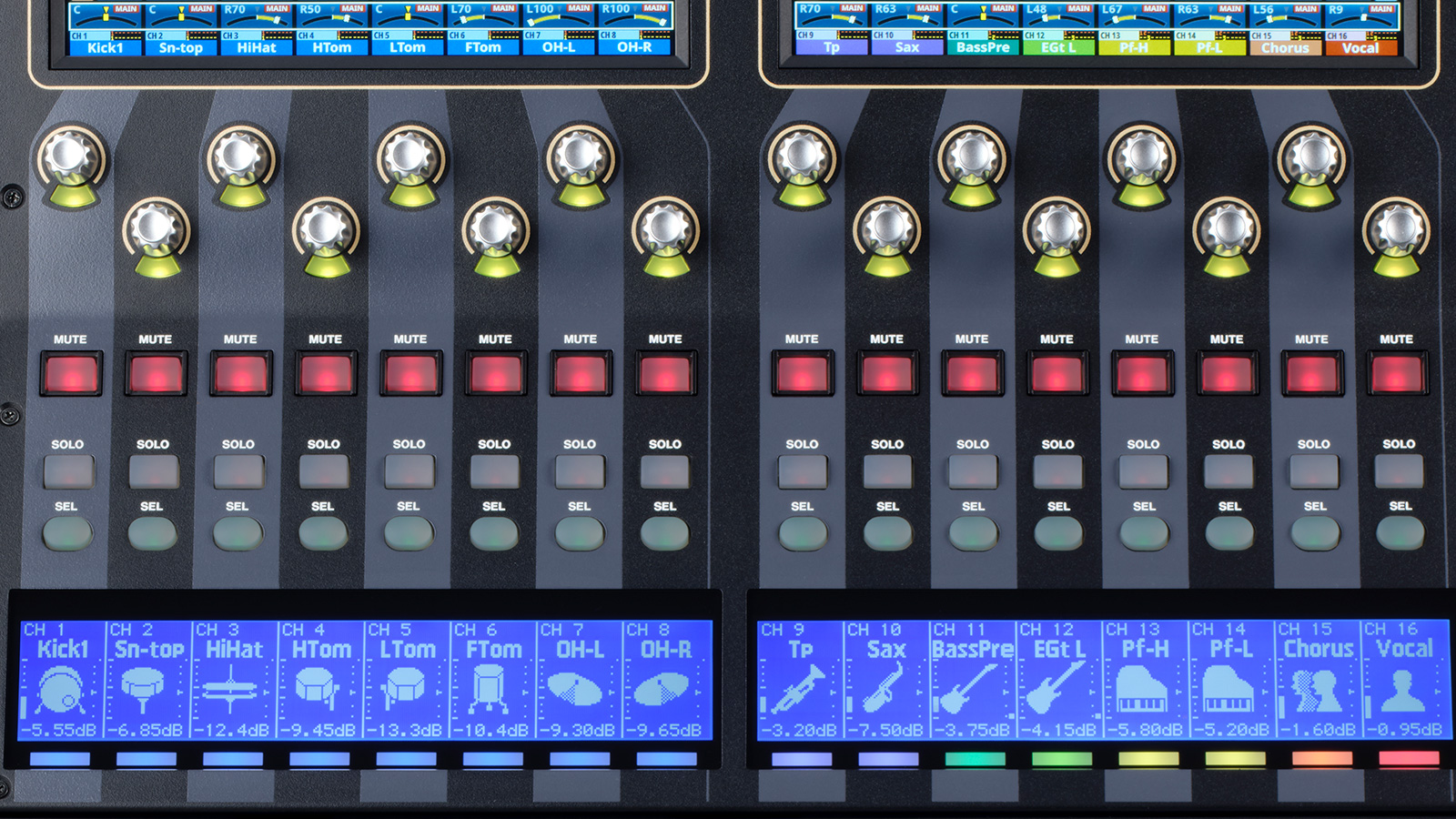
Clear, Mistake-free Navigation
When you're mixing a show, broadcast, or crucial recording session, you can't afford to hit the wrong button or grab the wrong control. TASCAM Sonicview's mixing surface makes it easy to see at a glance what you're controlling, even in a dark concert hall. Each channel strip includes a channel-name LCD with a full-color LED. The User keys feature full-color LEDs, so you can group each input source and function by color and view them easily. The Solo and Channel Select keys have distinctive shapes, and the Mute key is guarded with a cap. With these features and the customizable touch panels, you always know where you are and what you're controlling.
Auto Mixer (supported in V2.0.0)
The TASCAM Sonicview features a gain-sharing Auto Mixer function that automatically controls gain in real time, ensuring optimal conditions at all times during panel discussions, events, and talk shows where multiple participants are speaking.
Four groups allow up to four different mixes to be created independently for each group. A PRIORITY function that enables only the chairperson or moderator to speak, and a WEIGHT function allows the level of a particular channel to be mixed higher or lower for each group.
The PRIORITY function can also be externally controlled via GPIO IN.

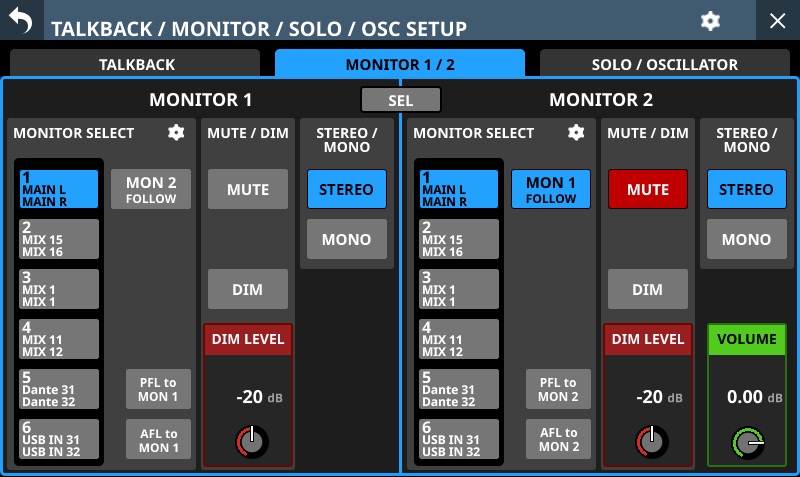
An additional monitor bus system and OSC/talkback capability add more versatility for broadcast and monitoring applications (supported in V1.5.0)
Two monitor buses are now available with V1.5.0, Monitor 1 and Monitor 2. Each monitor section comes with 6 switchable monitor source presets with essential functions such as MUTE/DIMMER. In addition, a location setting has been added to automatically mute the monitor speakers when in the same enclosed space as a live microphone.
Input sources can be freely assigned in the talkback section. Also, outputs can now be directly assigned into each bus or monitor, or to output routers. All of these settings and OSC on/off settings can be assigned to, and controlled by USER keys for quick control a variety of broadcast system and monitoring environments.
Audio Follow Video Function to Link Video and Audio (supported in V1.6.1)
The corresponding audio fader level can be operated in conjunction with the video material tally from the video switcher. Tally events can be input via GPIO, with 8 inputs on the TASCAM Sonicview and up to 40 inputs when a SB-16D is connected.
Various parameters (ON LEVEL, OFF LEVEL, WAIT TIME, RISE TIME, HOLD TIME, FALL TIME) can be set on the channel selected as the control target. It enables simple sound and video interlocking operation in broadcast studio systems as well as in various outside broadcasting such as sports.


SMPTE ST2110 Compliant (supported in V2.0.0)
By installing the optional IF-ST2110 card (sold separately), IP connection compliant with SMPTE ST 2110 is possible, making TASCAM Sonicview a mixer that is compatible with a ST2110 system.
Main Features – IF-ST2110 Expansion Card
- Compliant with ST2110-30/31 and AES67 standards
- 64in/64out (48kHz), 32in/32out (96kHz) audio transmission
- Redundancy (ST2022-7) compliant
- Equipped with media stream and independent control ports
- NMOS IS-04/05
- WebUI app included for system control
Remote Control With Ember+ (supported in 2.2.0)
Integrate your TASCAM Sonicview console into your Ember+ network and unlock powerful remote control capabilities. With expanded protocol support, a wide range of Sonicview parameters are now accessible remotely - bringing deeper connectivity and control to your workflow.
* Use the Ethernet port on the TASCAM Sonicview main unit for Ember+.
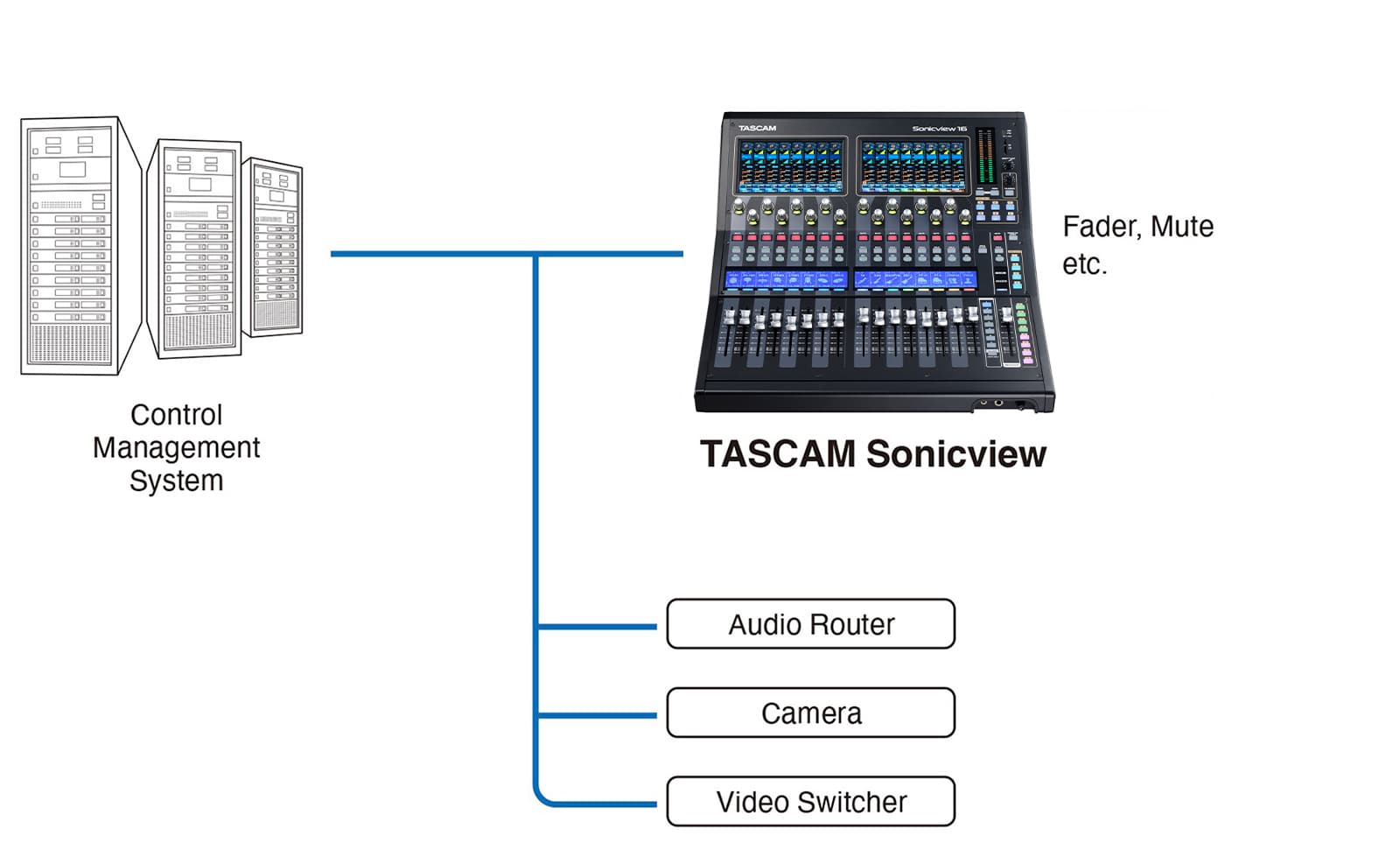

Monitoring via Network Using SNMP (supported in V2.0.0)
The TASCAM Sonicview supports SNMPv1 and SNMPv2c, allowing monitoring of the unit over the network.
* Use the Ethernet port on the TASCAM Sonicview main unit for SNMP.Personal Monitor Control with Mixing Station App
Take the reins on stage and control your personal mix with Sonicview and the Mixing Station app. Performers can run up to 12 validated app instances - each with full control and real-time metering. Need more? Additional devices can still connect for control, though metering is limited to the first 12. Adjust EQ, levels, aux sends, and more - all from the palm of your hand.
* Compatible with Sonicview V2.2.3 or later.
The Mixing Station app can be purchased and downloaded at:
https://mixingstation.app/

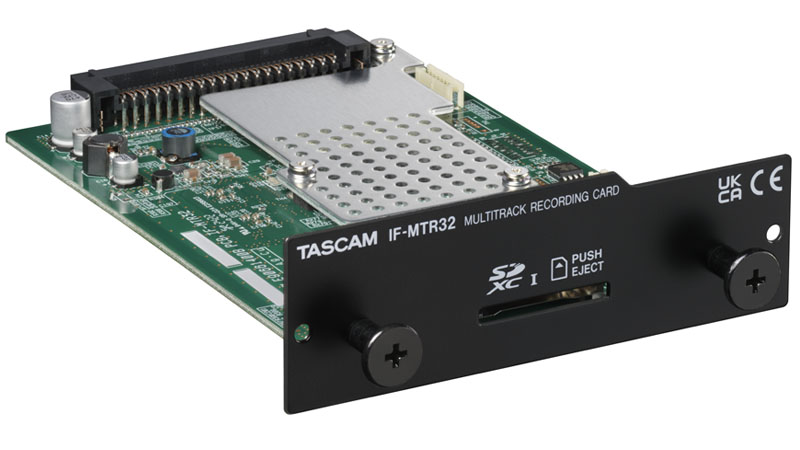
Physical Outputs and Expansion Capability
As you'd expect, the TASCAM Sonicview 16 offers plenty of physical outputs, with 16 XLR line outputs, the L/R main outputs, and two XLR monitor outputs. If that's not enough, you can add more analog outputs, MADI, Dante or AES/EBU I/O with an optional expansion card, in addition to the IF-MTR32 multi-track SD recording card.
Read More
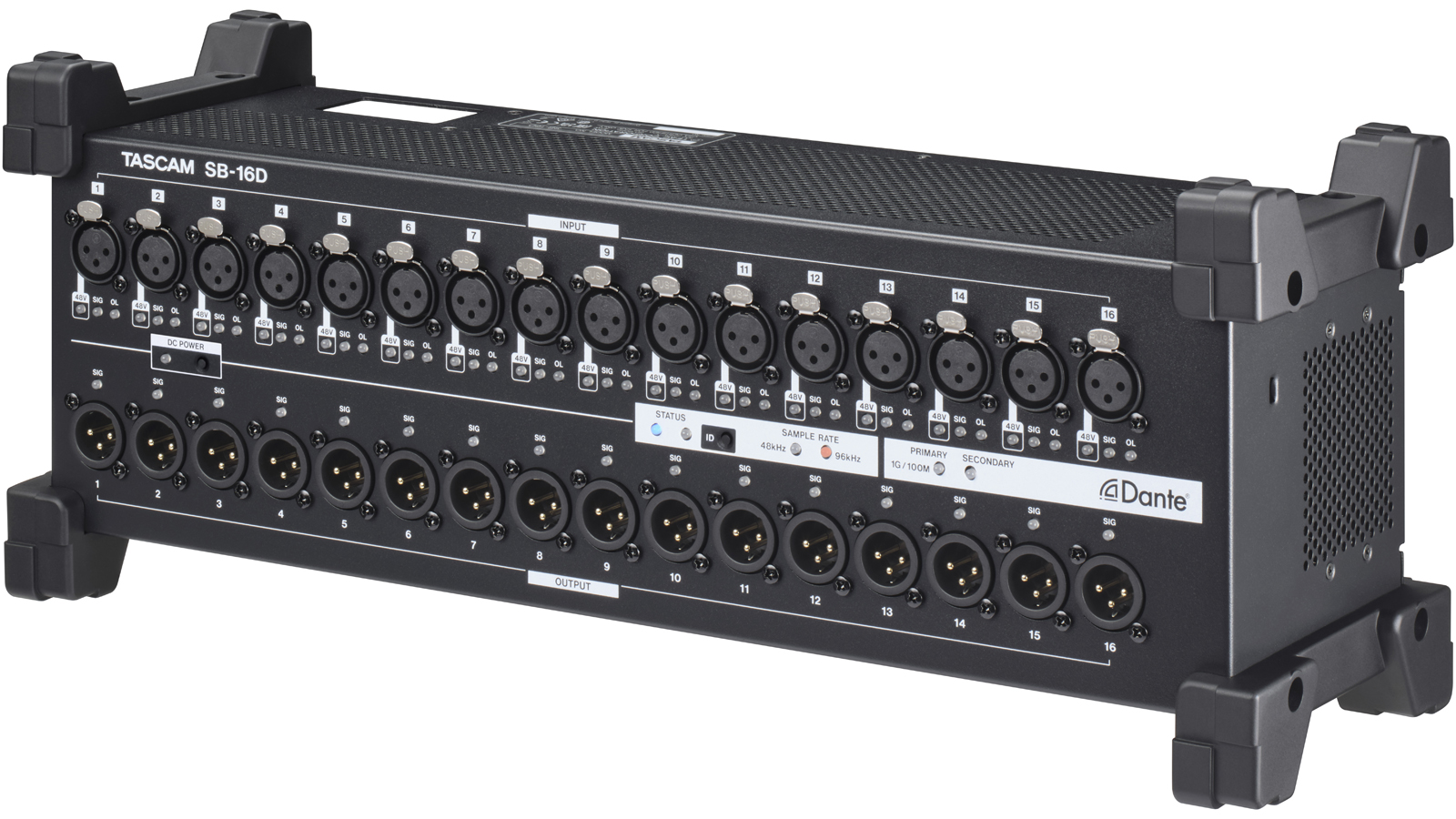
To further expand the system, add one or more optional 16-in/16-out SB-16D Dante-networked stage boxes. Microphone gain for all 16 inputs can be remotely controlled from the TASCAM Sonicview 16, and the SB-16D can be used as a floor box or rack mounted.
Read More
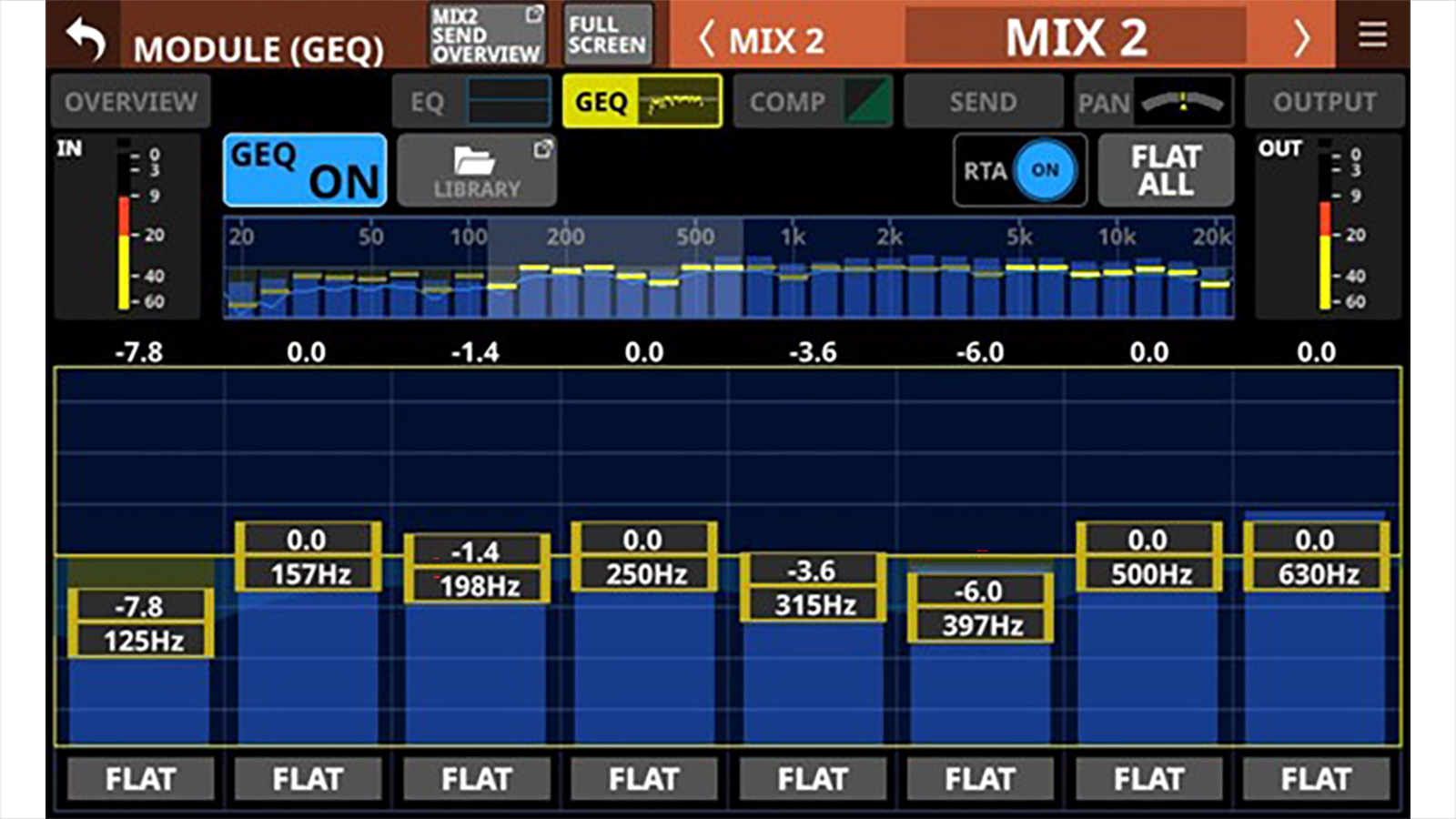
Output Buses and Processing
You get a wealth of output buses, with powerful signal processing and flexible routing options. In addition to the main L/R stereo bus, the TASCAM Sonicview 16 provides 22 output flex buses, each of which is configurable as a subgroup, aux, or matrix. Provide multiple stereo in-ear monitor submixes without running short of buses and send to the analog outputs; create matrix mixes for multiple loudspeaker zones and send over the Dante network for restaurants and worship performances; and more. All output buses are equipped with 31-band graphic EQ, realtime analyzer functions, 4-band parametric EQ, compressor/ducker, delay, plus Solo, Pan, and Mute. Four additional effects processors can be assigned to any individual mixer channels for even more including an astounding reverb effect.
Read More
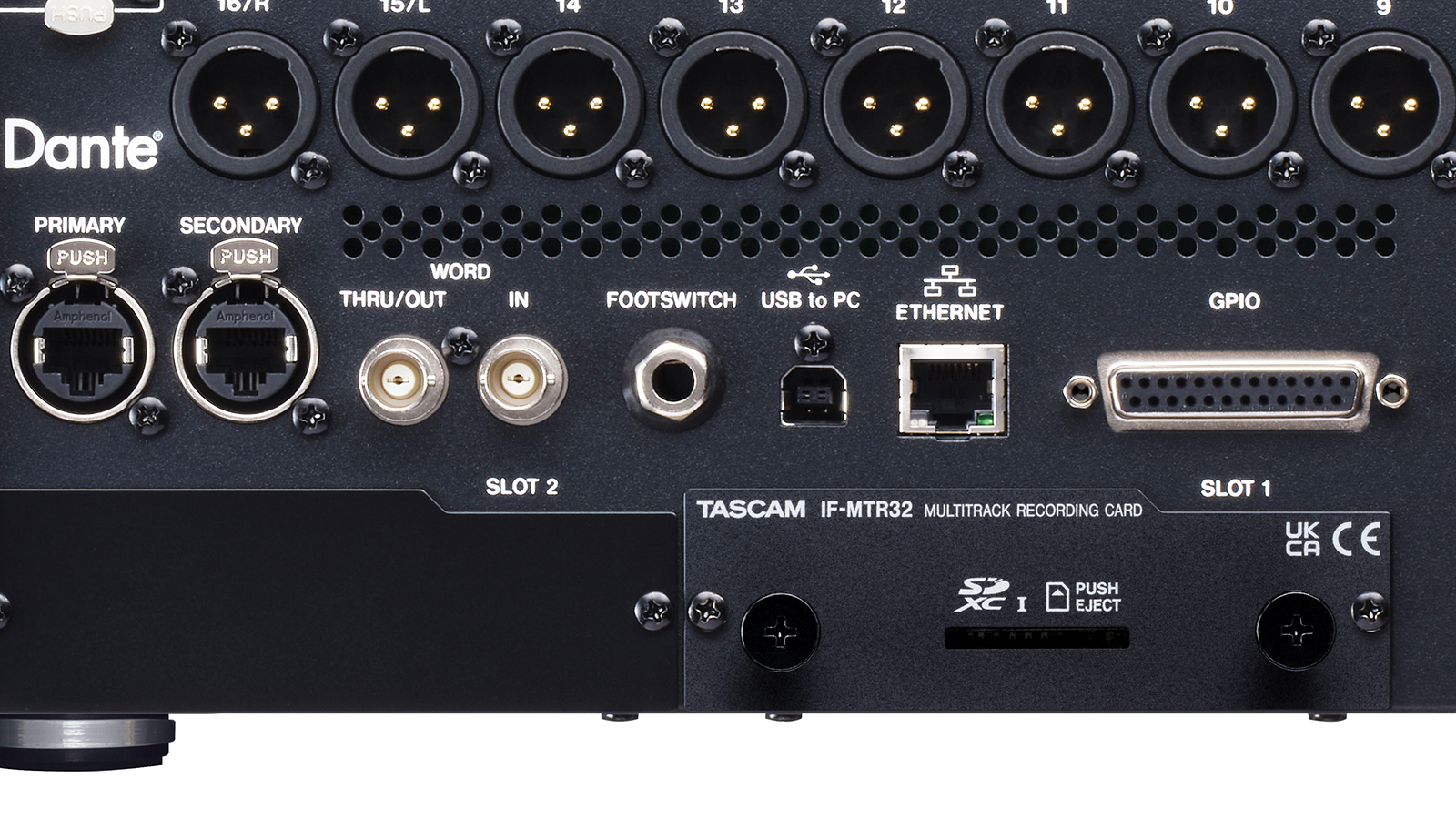
External Control, Clocking, and More
In addition to audio I/O, Dante, and USB ports, TASCAM Sonicview is equipped with 8-in/8-out GPIO terminals (on a DB25 connector) for external control, making it suitable for events and relay applications. BNC word clock In and Out/Thru enable digital audio synchronization, and an Ethernet port can connect to a Wi-Fi router for wireless control. TASCAM Sonicview also has two TASCAM expansion slots; accepts a selection of expansion cards.
Read More
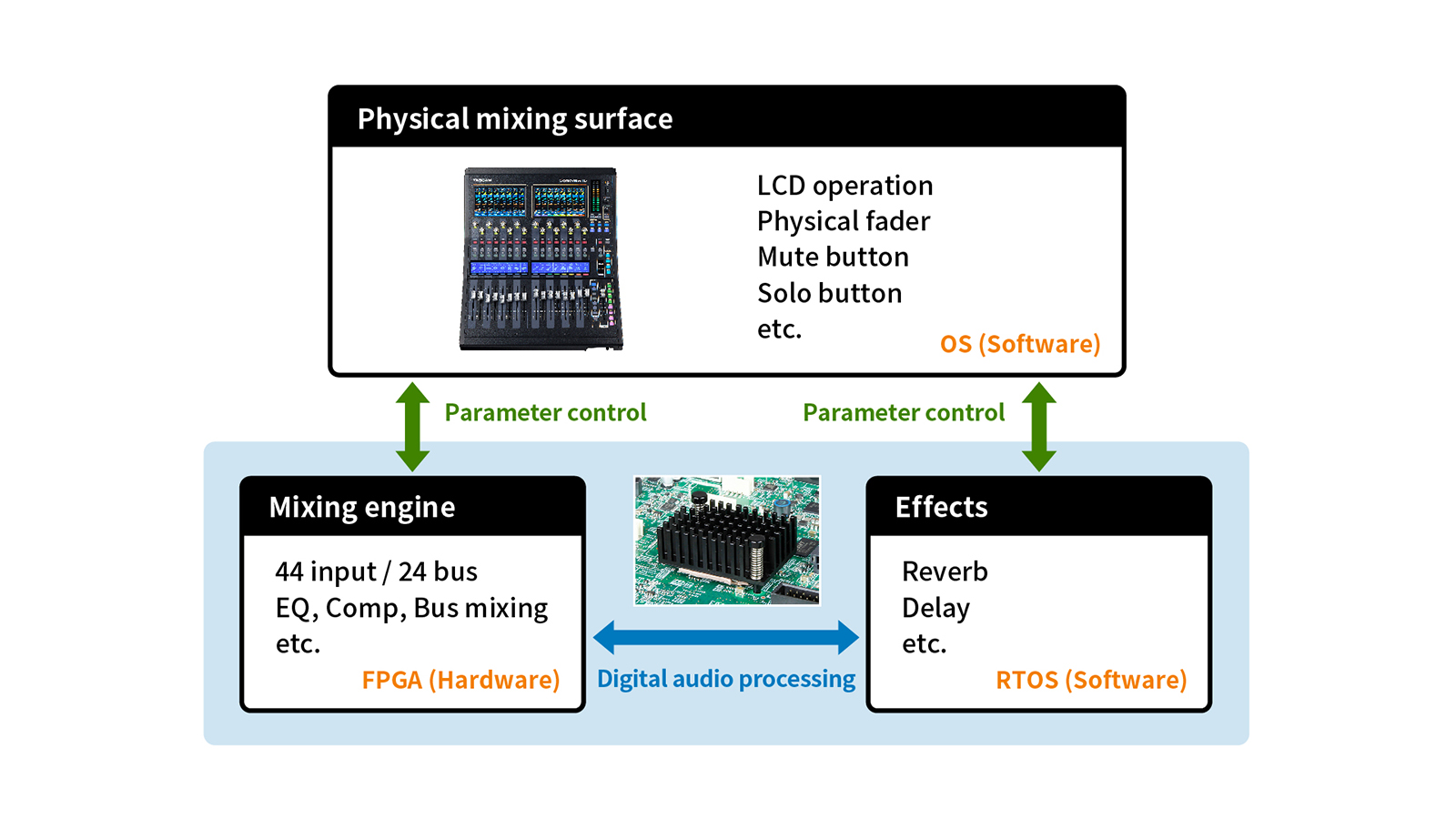
The Music Never Stops
Your business depends on reliable equipment that will stay in service with minimal interruptions, and we designed TASCAM Sonicview accordingly. TASCAM Sonicview's mixing engine and real-time operating system are completely separated from the physical mixing surface, greatly improving stability. In the unlikely event that the mixing surface becomes inoperable, the sound won't stop, and operation can be restored by restarting the control surface operating system. Meanwhile, the show will go on.
Read More

Physical Outputs and Expansion Capability
As you'd expect, the TASCAM Sonicview 16 offers plenty of physical outputs, with 16 XLR line outputs, the L/R main outputs, and two XLR monitor outputs. If that's not enough, you can add more analog outputs, MADI, Dante or AES/EBU I/O with an optional expansion card, in addition to the IF-MTR32 multi-track SD recording card.

To further expand the system, add one or more optional 16-in/16-out SB-16D Dante-networked stage boxes. Microphone gain for all 16 inputs can be remotely controlled from the TASCAM Sonicview 16, and the SB-16D can be used as a floor box or rack mounted.

Output Buses and Processing
You get a wealth of output buses, with powerful signal processing and flexible routing options. In addition to the main L/R stereo bus, the TASCAM Sonicview 24 provides 22 output flex buses, each of which is configurable as a subgroup, aux, or matrix. Provide multiple stereo in-ear monitor submixes without running short of buses and send to the analog outputs; create matrix mixes for multiple loudspeaker zones and send over the Dante network for restaurants and worship performances; and more. All output buses are equipped with 31-band graphic EQ, realtime analyzer functions, 4-band parametric EQ, compressor/ducker, delay, plus Solo, Pan, and Mute. Four additional effects processors can be assigned to any individual mixer channels for even more including an astounding reverb effect.

External Control, Clocking, and More
In addition to audio I/O, Dante, and USB ports, TASCAM Sonicview is equipped with 8-in/8-out GPIO terminals (on a DB25 connector) for external control, making it suitable for events and relay applications. BNC word clock In and Out/Thru enable digital audio synchronization, and an Ethernet port can connect to a Wi-Fi router for wireless control. TASCAM Sonicview also has two TASCAM expansion slots; accepts a selection of expansion cards.

The Music Never Stops
Your business depends on reliable equipment that will stay in service with minimal interruptions, and we designed TASCAM Sonicview accordingly. TASCAM Sonicview's mixing engine and real-time operating system are completely separated from the physical mixing surface, greatly improving stability. In the unlikely event that the mixing surface becomes inoperable, the sound won't stop, and operation can be restored by restarting the control surface operating system. Meanwhile, the show will go on.
Features at a Glance
- DC power redundancy built in (TASCAM Sonicview 16dp only)
- TASCAM VIEW (Visual Interactive Ergonomic Workflow) interface supports intuitive operation with three different view system
- Multiple displays with two 7-inch touch panels
- 44 input channels (or 40 mono input channels and 2 stereo input channels) and 4 FX return
- 22 flexible output buses and main L/R bus with 31-band graphic EQ
- 96 kHz, 54-bit float-point FPGA mixing engine
- Ultra-low latency: 2 x samples (20.8µS) in mixing engine, 0.51 ms analog-to-analog
- 32-bit/96 kHz AD/DA conversion
- TASCAM Class 1 HDIA microphone preamplifiers
- 32-in/32-out, 32-bit/96 kHz USB audio interface
- 64-in/64-out built-in Dante interface; supports redundancy and DDM, AES67 and SMPTE ST 2110 interoperability
- 16 mic/line inputs (up to +32 dBu), 16 XLR line outputs with flexible routing
- 4 multi-effects processors
- TASCAM Sonicview Control software for macOS/Windows/iPadOS enables remote control and off-line editing
- 2 TASCAM expansion slots
- Optional SDXC multi-track recording, MADI, Dante, AES/EBU, analog outputs, SMPTE ST 2110 cards available. - Auto mixer function
- Compliant with ST2110-30/31 and AES67 standards (with optional IF-ST2110 Expansion card)
- Ember+ compatible, external control protocols with Ember+ are now open to the public
Other Features
- Hardware mixing surface and mixing engine operating system are independent of each other for high stability and continuous audio flow
- Library: Snapshot/Effect/Module/Parametric EQ/Graphic EQ/Gate/Compressor
- 18 assignable user key and extended using the LCD screen for up to 64 additional user keys.
- User Defined Control Library feature allows users to store and recall multiple User Key, GPIO and Foot Switch configurations
- 7 custom fader layers, 8 DCA groups
- 16+1 100mm motorized faders
- 16 encoder knobs with color LED
- 16 LCDs with color LED display channel name, input level, and gain reduction meter
- 2 ch internal recording/playback with SD card or USB flash drive
- 8 TRS line inputs, 2 RCA stereo input pairs, XLR talkback input
- XLR monitor outputs
- 1/4-inch and 1/8-inch headphone outputs
- Word clock In and Out/Thru
- 1000BASE-T gigabit Ethernet
- 8-in/8-out GPIO on DB25
- TRS footswitch jack
- XLR 4-31 lamp connector
- Power switch with guard
- Optional SB-16D 16-in, 16-out Dante-enabled stage box
- Rack mountable with optional AK-RMSV16 rack mount kit
- 2 monitor bus system and OSC/talkback capability
- RTB (Return Talkback) for two-way communication
- Audio Follow Video function to link video and audio
- User defined names can be set for input/output ports
- SNMP compatible
- 24 Input Port to Output Port Direct Routing
- Two input sources to one module as input Source A/B
- Supported by Mixing Station App for remote control (Compatible with Sonicview V2.2.3 or later)

Announcement Regarding V2.3.1 Firmware for TASCAM Sonicview Series and V2.3.1 Software for TASCAM Sonicview Control
Learn More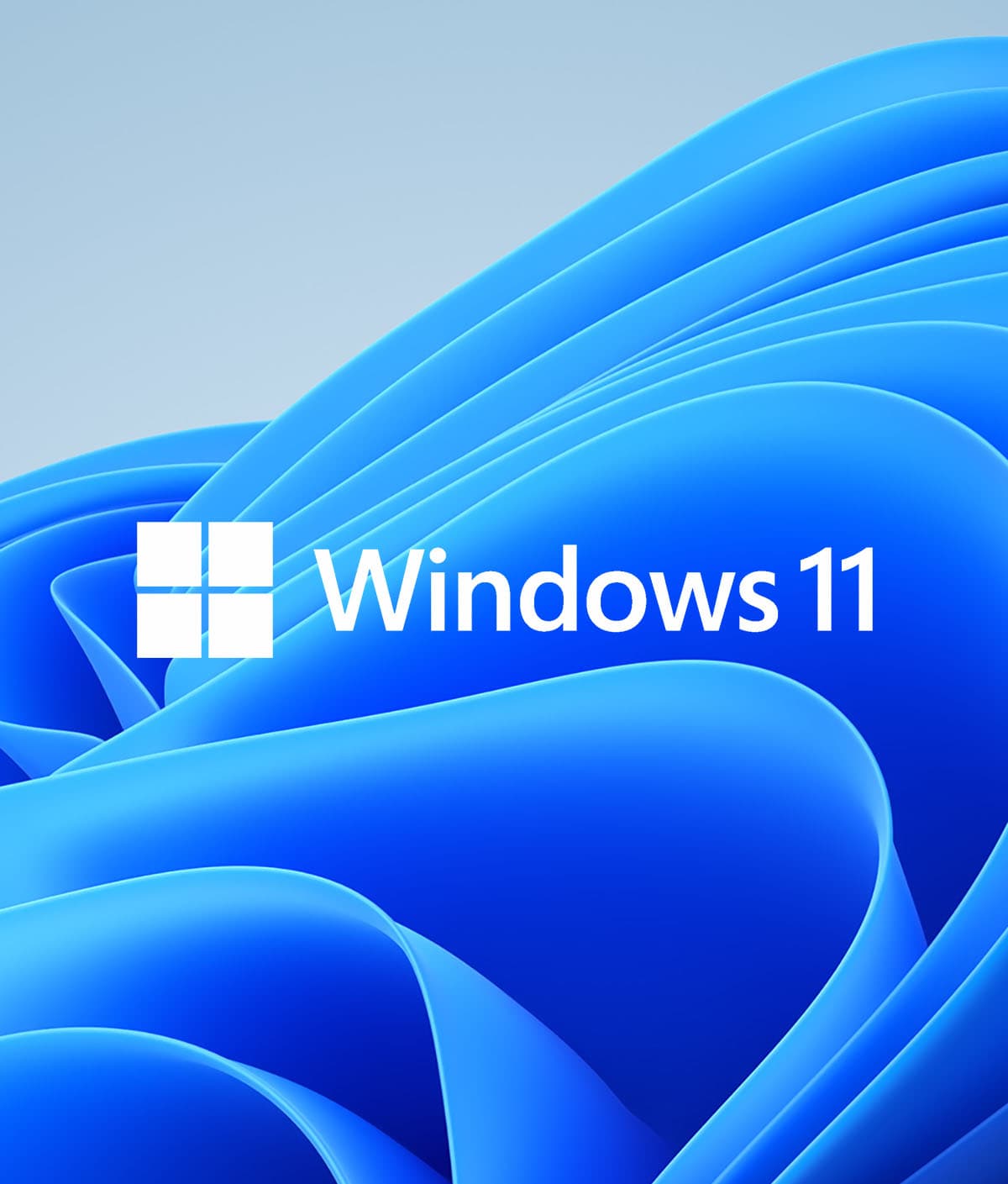
[Updated] Information about Windows 11 Version 25H2 compatibility
Learn MoreYou might also like
Spec description
| Mixer Specifications | |
| Processing Capability | |
| Input | 52 [Monaural: 40, Stereo: 2 (Stereo),Fx Return: 4 (Stereo)] |
| Bus | 32 [AUX/GROUP Switchable MIX bus: 22, MAIN L/R bus: 1 (Stereo), Fx Send bus: 4 (Stereo)] |
| Built in Fx | 4 |
| Input Ports | |
| 96 kHz | Max 152 ports |
| 48 kHz | Max 248 ports |
| MIC/LINE | 16 |
| Stereo (RCA) | 4 (2xStereo) |
| Dante | 32 (96 kHz), 64 (48 kHz) |
| SLOT | 32x2 (96 kHz), 64x2 (48 kHz) |
| USB Audio | 32 |
| Built in Player | 2 (1xStereo) |
| OSC | 1 |
| TALKBACK | 1 |
| Output Ports | |
| 96 kHz | Max 148 ports |
| 48 kHz | Max 244 ports |
| LINE | 16 |
| Dante | 32 (96 kHz), 64 (48 kHz) |
| SLOT | 32x2 (96 kHz), 64x2 (48 kHz) |
| USB Audio | 32 |
| MONITOR OUT (Analog) | 2 (1xStereo) |
| Built in Recorder | 2 (1xStereo) |
| I/O Ports | |
| Analog Insert I/O | 2 I/O (MIC/LINE Input 7/8) |
| Digital Signal Processing | |
| Mixer Engine | 96 kHz/54 bit floating point |
| ADC | 96 kHz, 32 bit |
| DAC | 96 kHz, 24 bit |
| Digital I/O sampling rate | 96 kHz, 48 kHz |
| Analog Audio Inputs/Outputs | |
| MIC/LINE inputs (1-16 channels) | |
| Connector | XLR-3-31 equivalent (1:GND,2:HOT,3:COLD) |
| Max input level | +12dBu (PAD=OFF, TRIM MIN), +32dBu (PAD=ON, TRIM MIN) |
| Min input level | -62dBu (PAD=OFF, TRIM MAX), -42dBu (PAD=ON, TRIM MAX) |
| Input impedance | 5.0kΩ or more |
| Phantom power | +48V available |
| LINE inputs (9-16 channels) | |
| Connector | Connector: Φ6.3mm(1/4")TRS phone jack, Balanced (TIP: HOT, RING: COLD, SLEEVE: GND) |
| Max input level | +12dBu (PAD=OFF, TRIM MIN), +32dBu (PAD=ON, TRIM MIN) |
| Min input level | -62dBu (PAD=OFF, TRIM MAX), -42dBu (PAD=ON, TRIM MAX) |
| Input impedance | 5.0kΩ or more |
| INSERT (7-8 channels) | |
| Connector | Φ6.3mm(1/4")TRS phone jack (TIP: SEND, RING: RETURN, SLEEVE: GND) |
| RETURN (RING) | |
| Max input level | +18dBu |
| Nominal Input level | -2dBu |
| Input impedance | 5.0kΩ or more |
| SEND (TIP) | |
| Max input level | +18dBu |
| Nominal Input level | -2dBu |
| Input impedance | 100kΩ or less |
| TALKBACK inputs | |
| Connector | XLR-3-31 equivalent (1: GND,2: HOT,3: COLD) |
| Max input level | +10dBu |
| Min input level | -65dBu |
| Gain range | 0 - 55dB |
| Input impedance | 5.0kΩ or more |
| Phantom power | +48V available |
| Stereo (RCA) inputs (1-2) | |
| Connector | RCA pin jack |
| Max input level | +6dBV (1.995Vrms) |
| Nominal Input level | -10dBV (0.316Vrms) |
| Head room | 16dB |
| Input impedance | 10kΩ or more |
| LINE Outputs (1-16 channels) | |
| Connector | XLR-3-32 equivalent (1: GND, 2: HOT, 3: COLD) |
| Nominal output level | +6dBu (D.ref: -9dBFS) +4dBu (D.ref: -14dBFS, -16dBFS) +4dBu or 0dBu (D.ref: -18dBFS, -20dBFS) |
| Max output level | +15dBu (D.ref.: -9dBFS, A.ref.: +6dBu) +18dBu (D.ref.: -14dBFS, A.ref.: +4dBu) +20dBu (D.ref.: -16dBFS, A.ref.: +4dBu) +18dBu (D.ref.: -18dBFS, A.ref.: 0dBu) +20dBu (D.ref.: -20dBFS, A.ref.: 0dBu) +22dBu (D.ref.: -18dBFS, A.ref.: +4dBu) +24dBu (D.ref.: -20dBFS, A.ref.: +4dBu) |
| Output impedance | 100Ω or less |
| MONITOR Outputs (L,R) | |
| Connector | XLR-3-32 equivalent (1: GND, 2: HOT, 3: COLD) |
| Max output level | +24dBu |
| Nominal output level | +4dBu |
| Output impedance | 100Ω or less |
| Headphone Output | |
| Connector | Φ6.3mm(1/4") stereo phone jack and 3.5mm stereo mini phone jack |
| Max output power | 100mW + 100mW (32Ω load, when connected to only one side) |
| Digital Audio Inputs/Outputs | |
| USB Audio | |
| Connector | Type-B |
| Input | 32ch *USB to Sonicview |
| Output | 32ch *Sonicview to USB |
| Sampling rate | 48 kHz, 96 kHz |
| Bit depth | 32 bit |
| Dante (Primary/Secondary) | |
| Connector | etherCON Cat5e compatible |
| Number of channels | 64 channels (48 kHz), 32 channels (96 kHz) |
| Ethernet | 1000BASE-T (IEEE802.3ab) |
| Cable | CAT5e STP |
| Supports Redundant mode and Switched mode | |
| Control Inputs/Outputs | |
| GPIO | DSUB25pin female, inch type |
| Input circuit | pull up (5V) |
| Output circuit | Open corrector |
| Output impedance | 10Ω |
| Voltage Resistance | 20V |
| Max Current | 35mA |
| Max supply current (+5V) | 50mA |
| FOOT SWITCH | |
| Connector | Φ6.3mm(1/4")TS phone jack (TIP:SIG, SLEEVE: GND) |
| ETHERNET (for control) | |
| Connector | RJ-45 |
| Ethernet | 100BASE-TX, 1000BASE-T |
| Protocol | TCP/IP |
| Other Inputs/Outputs | |
| WORD IN | |
| Connector | BNC (Unbalanced) |
| Input level | 0.5Vpp - 5Vpp |
| Impedance | 75Ω +/-10% |
| Input frequency | 48 kHz, 96 kHz |
| Allowable frequency deviation | +/-100ppm |
| WORD THRU/OUT | |
| Connector | BNC (Unbalanced) |
| Output level | equivalent to 5V TTL |
| Output frequency | 48kHz, 96kHz |
| Impedance | 75Ω +/-10% |
| USB (Top panel) | For Keyboard, and Mass Storage |
| Connector | Type-C |
| Standard | USB2.0 HIGH SPEED (480Mbps) |
| Bus power | 5V-0.5A |
| Class | HID, Mass storage |
| USB (Rear panel) | For Audio Interface (Dedicated driver required) |
| Connector | Type-B |
| Standard | USB2.0 HIGH SPEED (480Mbps) |
| Lamp | |
| Connector | XLR 4pin female (1:N.A., 2:N.A., 3:GND, 4:+12V) |
| Supply voltage | 0V-12V (Adjustable brightness) |
| Max power | 5W |
| EXT DC IN | * TASCAM Sonicview 16dp only |
| Connector | XLR-4-32 equivalent (1:-, 2:NC, 3:NC, 4:+) |
| Recorder/Player | |
| Media | |
| SD Card | SDHC (8GB-32GB Class10 or more), SDXC (64GB-128GB Class10 or more) |
| USB memory | Size: 8GB-128GB (Play Only) |
| Supported File System: | FAT32 (SDHC, USB memory) exFAT (SDXC, USB memory) |
| Stereo recording/Playback Formats | |
| WAV/BWF | |
| Recording | 48 kHz/96 kHz, 24 bit, 2ch |
| Playback | 48 kHz/96 kHz, 16/24bit、2ch |
| MP3 | |
| Playback | 44.1 kHz/48 kHz, 32kbps~320kbps |
| AAC | |
| Playback | 44.1 kHz/48 kHz, 64kbps~320kbps |
| General | |
| Main display | 7 inch, Colored touch panel display x2 |
| Resolution | 800x480 |
| Channel display | Monochrome x2 |
| Resolution | 384x68 |
| Fader | 100mm stroke, Motor driven |
| Overall dimensions | 472.0(W) x 228.1(H) x 554.4(D) mm 18.59 (W) x 8.99(H) x 21.83 (D) inch |
| Weight | 13kg / 28.67lb |
| Power | |
| TASCAM Sonicview 16 | AC100V-240V 50/60Hz |
| TASCAM Sonicview 16dp | AC100V-240V 50/60Hz DC14 – 27V, 6 – 3A |
| Power consumption | 65W |
| Operating Temperatures | 0 - 40 ℃ |
| Computer system requirements | |
| USB Audio Interface | |
| Windows | |
| Supported Operating System | Windows 11 64 bit Windows 10 64 bit |
| Computer hardware requirements | Windows computer with a USB2.0(or higher) port. |
| Mac | |
| Supported Operating System | macOS Sequoia macOS Sonoma macOS Ventura macOS Monterey macOS Big Sur macOS Catalina |
| Computer hardware requirements | Mac with a USB2.0(or higher) port. |
| Control Software | |
| Windows | Windows 11 64 bit Windows 10 64 bit |
| Mac | macOS Sequoia macOS Sonoma macOS Ventura macOS Monterey macOS Big Sur macOS Catalina |
| iPadOS | iPadOS 18 iPadOS 17 iPadOS 16 iPadOS 15 iPadOS 14 |
Signal Delay
| 48kHz | [ ms ] | Routing |
| A to A | 0.510 | MIC/LINE IN → CH Module → MAIN L/R BUS → MAIN L/R Module→ LINE OUT |
| A to A | 0.620 | MIC/LINE IN → CH Module → MAIN L/R BUS → MAIN L/R Module → MONITOR OUT |
| D to D | 0.498 | SLOT MADI IN → CH Module → MAIN L/R BUS → MAIN L/R Module → SLOT MADI OUT |
| A to D | 0.458 | MIC/LINE IN → CH Module → MAIN L/R BUS → MAIN L/R Module → SLOT MADI OUT |
| D to A | 0.571 | SLOT MADI IN → CH Module → MAIN L/R BUS → MAIN L/R Module → LINE OUT |
| D to A | 0.666 | SLOT MADI IN → CH Module → MAIN L/R BUS → MAIN L/R Module → MONITOR OUT |
| 96kHz | [ ms ] | Routing |
| A to A | 0.510 | MIC/LINE IN → CH Module → MAIN L/R BUS → MAIN L/R Module → LINE OUT |
| A to A | 0.620 | MIC/LINE IN → CH Module → MAIN L/R BUS → MAIN L/R Module → MONITOR OUT |
| D to D | 0.104 | SLOT MADI IN → CH Module → MAIN L/R BUS → MAIN L/R Module → SLOT MADI OUT |
| A to D | 0.261 | MIC/LINE IN → CH Module → MAIN L/R BUS → MAIN L/R Module → SLOT MADI OUT |
| D to A | 0.374 | SLOT MADI IN → CH Module → MAIN L/R BUS → MAIN L/R Module → LINE OUT |
| D to A | 0.468 | SLOT MADI IN → CH Module → MAIN L/R BUS→MAIN L/R Module → MONITOR OUT |
Audio Performance
| MIC PRE AMP EIN (Equivalent Input Noise) | -128dBu or less |
| Frequency response | MIC/LINE IN → LINE OUT 20Hz - 20kHz:+0dB, -0.5dB (48kHz)(JEITA) 20Hz - 40kHz:+0dB, -1.0dB (96kHz)(JEITA) |
| Dynamic range | 108dB or more (MIC/LINE IN → LINE OUT, PAD=OFF, TRIM MIN, D.ref=-20dBFS, Clock Master=INT, JEITA) |
| 110dB or more (MIC/LINE IN → Dante OUT, PAD=OFF, TRIM MIN, JEITA) | |
| 112dB or more (Dante IN → LINE OUT, Clock Master=INT, JEITA) | |
| Distortion | 0.002% or less (MIC/LINE IN → LINE OUT, When inputting +4dBu, PAD=OFF, TRIM MIN, JEITA) |
| 0.002% or less (MIC/LINE IN → Dante OUT, When inputting +4dBu, PAD=OFF, TRIM MIN, JEITA) | |
| 0.002% or less (Dante IN → LINE OUT, When inputting 0dBFs, JEITA) | |
| Crosstalk | 100dB or more (MIC/LINE IN → LINE OUT, 1kHz Sine wave, JEITA) |
*0dBu=0.775Vrms
*D.ref.: Digital reference level, A.ref.: Analog reference level
Specifications and appearance are subject to change without notice for improvement.
Supported OS' (PC)
Windows
Windows 11 2025 Update (Version 25H2) New , Windows 11 2024 Update (Version 24H2) , Windows 11 2023 Update (Version 23H2) , Windows 10 2022 Update (Version 22H2) , Windows 11 2022 Update (Version 22H2) , Windows 11 (Version 21H2) , Windows 10 (November 2021 Update)Mac
macOS Tahoe New , macOS Sequoia , macOS Sonoma , macOS Ventura , macOS Monterey , macOS Big Sur , macOS CatalinaInformation
Please always use the latest version of Sonicview firmware and software. We do not recommend downgrading the firmware or software.
Recalling settings data (All System Data, Snapshots, various libraries) saved with the latest version in an older version could cause inconsistencies.
If you must downgrade, execute a factory reset on the All system data Screen to restore the factory settings.
Please do not recall any settings saved before downgrading.
Audinate has reported a problem with the Dante Updater failing to update Brooklyn 3.
When updating the Dante module firmware using Dante Controller, always use Dante Controller v4.14.2.1 (Windows/macOS) or later to perform the update.
Dante Controller detailed information
https://my.audinate.com/support/downloads/dante-controller
Latest version info
TASCAM Sonicview 24 / TASCAM Sonicview 16
| Firmware | V2.3.1 |
| Dante module firmware (Dante Brooklyn II) | V1.0.4 |
| Dante module firmware (Dante Brooklyn 3) | V1.0.4 |
| TASCAM Sonicview USB for Windows | V1.10 |
| TASCAM Sonicview Control for Windows | V2.3.1 |
| TASCAM Sonicview Control for Mac | V2.3.1 |
| TASCAM Sonicview Control for iPadOS | V2.3.1 |
SB-16D
| Firmware | V1.21 |
| Dante module firmware (Dante Brooklyn II) | V1.0.1 |
| Dante module firmware (Dante Brooklyn 3) | V1.0.2 |
| TASCAM IO CONTROL for Windows | V1.1.1 |
| TASCAM IO CONTROL for Mac | V1.1.1 |
| TASCAM IO CONTROL for iPadOS | V1.1.1 |
IF-MTR32
| Firmware | V1.12 |
IF-ST2110
| Firmware | V0109 |
| ST 2110 module | V1.0.2 |
- Supported the power-redundant models TASCAM Sonicview 16dp / 24dp and added the following functions:
- Added the POWER REDUNDANCY CHECK switch to turn the alert message on/off and show the voltage statuses to the Preferences screen.
- Added the POWER indicators that show the voltage statuses to the upper right of the INFORMATION screen.
- Added power status items to ERROR/ALERT and INFORMATION on the GPIO-OUT page.
- Added power status-related messages to error/alert messages.
- In User Key / Foot Switch / GPIO-IN settings, the "METER SETUP" option has been added to Parameter2 of Screen > METER.
- On the Network Setup screen, the initial password has been changed to a unique password for each unit.
Note: Units shipped with firmware versions earlier than V2.3.1 are not affected by this change. - On the HOME screen SEND area, when AUTO MIXER was displayed and WEIGHT was selected, changing the SEND area display still allowed the WEIGHT value to be adjusted using the LCD knob. This has been fixed.
- When the MIX module OUTPUT was set to Dante and the Metering Point was set to OUTPUT, the meters on the OVERVIEW screen or channel screen might not function correctly. This has been fixed.
- SB-16D settings might not be correctly reflected when recalling All System Data or Snapshots. This has been fixed.
- Assignment of the built-in RECORDER can now be enabled on the MIX module OUTPUT PORT SELECT screen.
- The Routing screen has been updated: tapping an item on the OUTPUT PORT page will transition to the OUTPUT MODULE tab.
- For Mute Status on the GPIO-OUT page, Parameter3 "Unmute - Closed" has been renamed to "Mute-Open," and the ON/OFF conditions for AND and OR have been reversed.
- In User Key / Foot Switch / GPIO-IN settings, the "Toggle" option has been added to Parameter2 of Input Source > ALL.
- When recalling Snapshots, Layer Key colors might not be correctly reflected. This has been fixed.
- In CH25–32 modules, noise could occur on the MIX module outputs under the following conditions. This has been fixed.
- DELAY set to ON and DELAY TIME greater than 0 msec
- DELAY POINT set to PRE FADER
- PRE/POST SETTINGS set to PRE
- Operation stability has been improved.
- New functions added in the main unit firmware (V2.3.1) are now supported.
- When SB-16D was unmounted, sending commands such as Analog Gain changes via Ember+ could cause the application to terminate unexpectedly. This has been fixed.
- Operation stability has been improved.
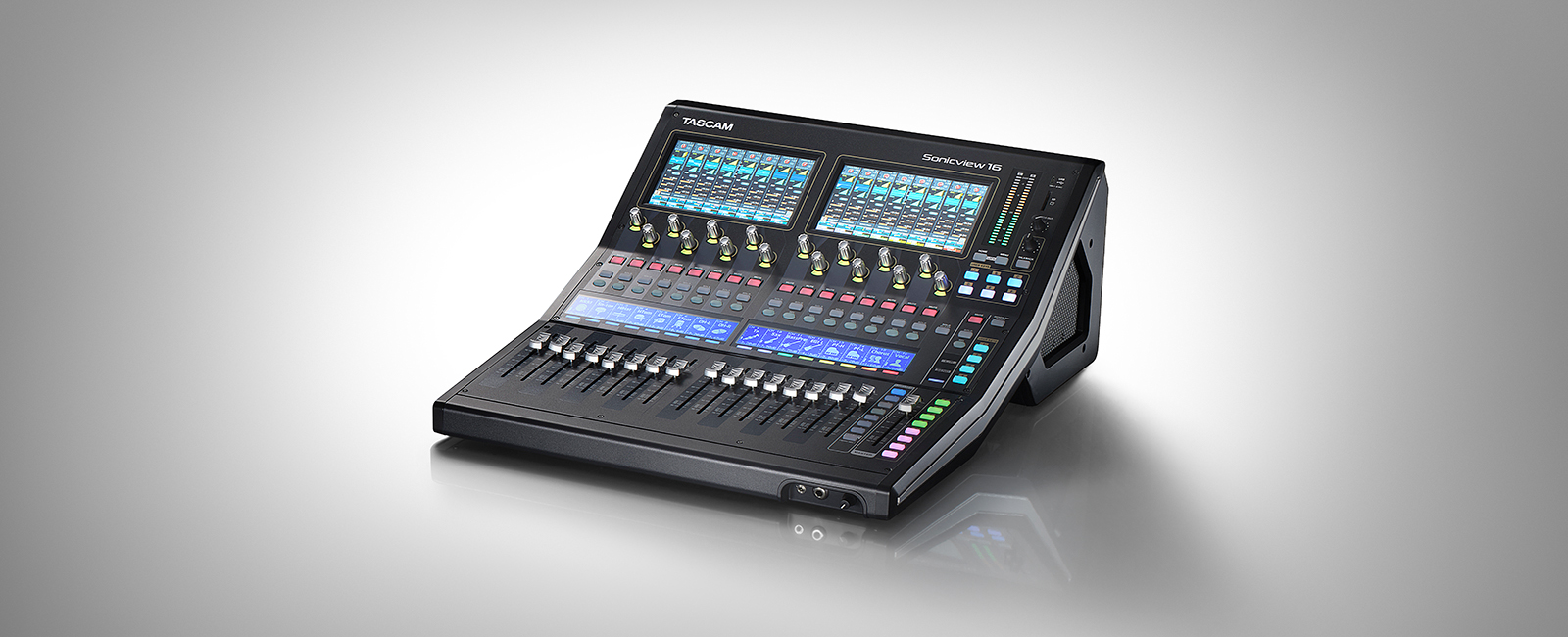
Notices About Products
Spec
| Remote control specifications (for Ember+) | 01-09-2026 | 0.0 KB |
|---|---|---|
| SNMP Private MIB | 01-09-2026 | 2.4 KB |
| Meter data protocol specifications | 06-17-2025 | 1018.6 KB |
| Specifications (English) | 01-11-2023 | 562.6 KB |
| CAD outline (PDF) | 05-25-2022 | 2.4 MB |
Manuals
| Reference Manual V2.3.0 (English) | 12-23-2025 | |
|---|---|---|
| Manuel de référence (Français) V2.0.0 | 05-12-2025 | 33.2 MB |
| Manual de referencia (Español) V2.0.0 | 05-12-2025 | 33.1 MB |
| Manuale di riferimento (Italiano) V2.0.0 | 05-12-2025 | 33.1 MB |
| Referenzhandbuch (Deutsch) V2.0.0 | 05-12-2025 | 29.1 MB |
| TASCAM Sonicview control User's Manual (English) V2.3.0 | 12-23-2025 | 5.5 MB |
| TASCAM Sonicview control Mode D'EMPLOI (Français) V2.3.0 | 12-23-2025 | 5.5 MB |
| TASCAM Sonicview control MANUAL DE INSTRUCCIONES (Español) V2.3.0 | 12-23-2025 | 5.5 MB |
| TASCAM Sonicview control Bedienungsanleitung (Deutsch) V2.3.0 | 12-23-2025 | 3.5 MB |
| TASCAM Sonicview control MANUALE DI ISTRUZIONI (Italiano) V2.3.0 | 12-23-2025 | 5.5 MB |
| Owner's Manual (English, Français, Español, Deutsch, Italiano, 日本語) | 01-11-2023 | 12.8 MB |
Documents
| TASCAM Sonicview Release Notes (English) | 12-23-2025 | 47.4 KB |
|---|---|---|
| TASCAM Sonicview Control Release Notes (English) | 12-23-2025 | 16.0 KB |
| Dante module firmware Release Notes | 06-17-2025 | 10.2 KB |
| Firmware update procedures (English) | 04-04-2024 | 301.6 KB |
| Dante module firmware update procedures (English) | 11-14-2023 | 1.3 MB |
Firmware
| TASCAM Sonicview Series Update Files | 12-23-2025 | 836.2 MB |
|---|---|---|
| Firmware V2.3.1 | 12-23-2025 | 429.5 MB |
| Firmware V2.2.3 | 11-06-2025 | 431.1 MB |
Software
| TASCAM Sonicview Control V2.3.1 for Windows | 12-23-2025 | 72.2 MB |
|---|---|---|
| TASCAM Sonicview Control V2.3.1 for Mac | 12-23-2025 | 117.4 MB |
| TASCAM Sonicview Control V2.3.1 for iPadOS | 12-23-2025 |
Windows Drivers
| TASCAM Sonicview USB for Windows V1.10 | 04-02-2025 | 25.0 MB |
|---|
Supported Media / Other
| IF-MTR32 Tested media List(slot 1) | 10-03-2023 | 115.3 KB |
|---|---|---|
| USB Supported Media | 08-22-2023 | 208.1 KB |
| SD Supported Media(front) | 08-22-2023 | 90.8 KB |
Catalogs
| TASCAM System Design Guide for Audio Installation, 2025 | 01-17-2025 | 9.3 MB |
|---|



